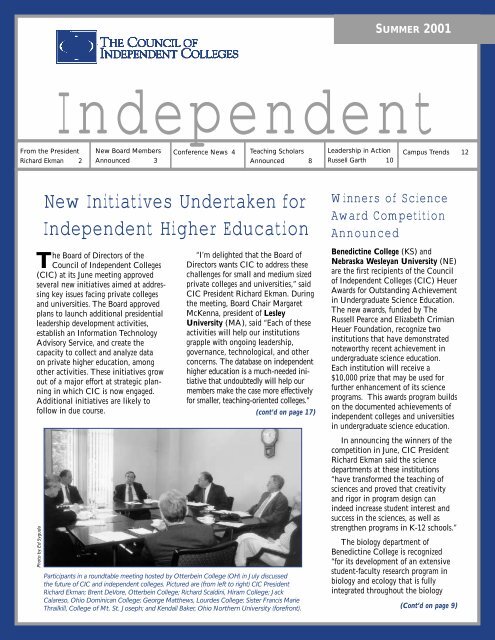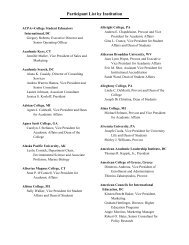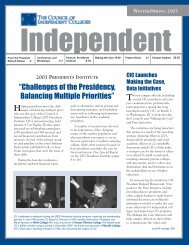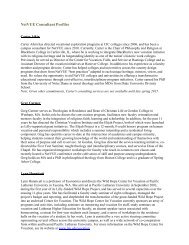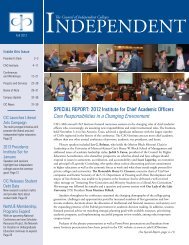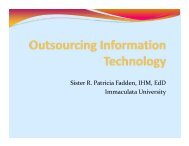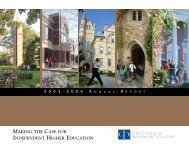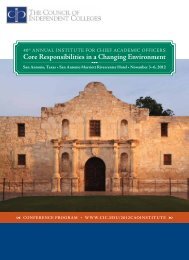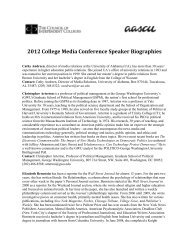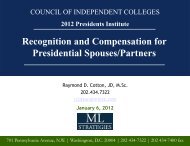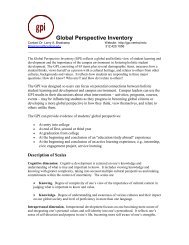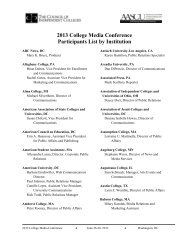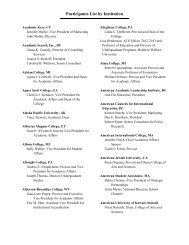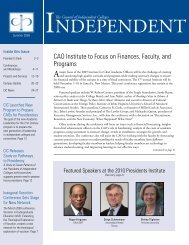Summer 2001 - The Council of Independent Colleges
Summer 2001 - The Council of Independent Colleges
Summer 2001 - The Council of Independent Colleges
You also want an ePaper? Increase the reach of your titles
YUMPU automatically turns print PDFs into web optimized ePapers that Google loves.
SUMMER <strong>2001</strong><br />
<strong>Independent</strong><br />
From the President<br />
Richard Ekman 2<br />
New Board Members<br />
Announced 3<br />
Conference News 4<br />
Teaching Scholars<br />
Announced 8<br />
Leadership in Action<br />
Russell Garth 10<br />
Campus Trends 12<br />
New Initiatives Undertaken for<br />
<strong>Independent</strong> Higher Education<br />
<strong>The</strong> Board <strong>of</strong> Directors <strong>of</strong> the<br />
<strong>Council</strong> <strong>of</strong> <strong>Independent</strong> <strong>Colleges</strong><br />
(CIC) at its June meeting approved<br />
several new initiatives aimed at addressing<br />
key issues facing private colleges<br />
and universities. <strong>The</strong> Board approved<br />
plans to launch additional presidential<br />
leadership development activities,<br />
establish an Information Technology<br />
Advisory Service, and create the<br />
capacity to collect and analyze data<br />
on private higher education, among<br />
other activities. <strong>The</strong>se initiatives grow<br />
out <strong>of</strong> a major effort at strategic planning<br />
in which CIC is now engaged.<br />
Additional initiatives are likely to<br />
follow in due course.<br />
Photo by Ed Syguda<br />
“I’m delighted that the Board <strong>of</strong><br />
Directors wants CIC to address these<br />
challenges for small and medium sized<br />
private colleges and universities,” said<br />
CIC President Richard Ekman. During<br />
the meeting, Board Chair Margaret<br />
McKenna, president <strong>of</strong> Lesley<br />
University (MA), said “Each <strong>of</strong> these<br />
activities will help our institutions<br />
grapple with ongoing leadership,<br />
governance, technological, and other<br />
concerns. <strong>The</strong> database on independent<br />
higher education is a much-needed initiative<br />
that undoubtedly will help our<br />
members make the case more effectively<br />
for smaller, teaching-oriented colleges.”<br />
(cont’d on page 17)<br />
Participants in a roundtable meeting hosted by Otterbein College (OH) in July discussed<br />
the future <strong>of</strong> CIC and independent colleges. Pictured are (from left to right) CIC President<br />
Richard Ekman; Brent DeVore, Otterbein College; Richard Scaldini, Hiram College; Jack<br />
Calareso, Ohio Dominican College; George Matthews, Lourdes College; Sister Francis Marie<br />
Thrailkill, College <strong>of</strong> Mt. St. Joseph; and Kendall Baker, Ohio Northern University (forefront).<br />
Winners <strong>of</strong> Science<br />
Award Competition<br />
Announced<br />
Benedictine College (KS) and<br />
Nebraska Wesleyan University (NE)<br />
are the first recipients <strong>of</strong> the <strong>Council</strong><br />
<strong>of</strong> <strong>Independent</strong> <strong>Colleges</strong> (CIC) Heuer<br />
Awards for Outstanding Achievement<br />
in Undergraduate Science Education.<br />
<strong>The</strong> new awards, funded by <strong>The</strong><br />
Russell Pearce and Elizabeth Crimian<br />
Heuer Foundation, recognize two<br />
institutions that have demonstrated<br />
noteworthy recent achievement in<br />
undergraduate science education.<br />
Each institution will receive a<br />
$10,000 prize that may be used for<br />
further enhancement <strong>of</strong> its science<br />
programs. This awards program builds<br />
on the documented achievements <strong>of</strong><br />
independent colleges and universities<br />
in undergraduate science education.<br />
In announcing the winners <strong>of</strong> the<br />
competition in June, CIC President<br />
Richard Ekman said the science<br />
departments at these institutions<br />
“have transformed the teaching <strong>of</strong><br />
sciences and proved that creativity<br />
and rigor in program design can<br />
indeed increase student interest and<br />
success in the sciences, as well as<br />
strengthen programs in K-12 schools.”<br />
<strong>The</strong> biology department <strong>of</strong><br />
Benedictine College is recognized<br />
“for its development <strong>of</strong> an extensive<br />
student-faculty research program in<br />
biology and ecology that is fully<br />
integrated throughout the biology<br />
(Cont’d on page 9)
BOARD OF DIRECTORS<br />
EXECUTIVE COMMITTEE<br />
Chair: Margaret A. McKenna,<br />
Lesley University<br />
Richard Detweiler, Hartwick College<br />
Catherine Dunn, BVM, Clarke College<br />
John L. Henderson, Wilberforce University<br />
Richard W. Kimball, <strong>The</strong> Teagle<br />
Foundation, Inc.<br />
Richard Kneedler, Franklin and<br />
Marshall College<br />
Douglas M. Orr, Jr., Warren Wilson College<br />
Richard Ekman, <strong>Council</strong> <strong>of</strong> <strong>Independent</strong><br />
<strong>Colleges</strong> (Ex Officio)<br />
DIRECTORS<br />
Loren Anderson, Pacific Lutheran University<br />
Delbert W. Baker, Oakwood College<br />
Dorothy G. Blaney, Cedar Crest College<br />
Doreen E. Boyce, <strong>The</strong> Buhl Foundation<br />
John F. Budd, Jr., <strong>The</strong> Omega Group<br />
R. Judson Carlberg, Gordon College<br />
Richard J. Cook, Allegheny College<br />
William H. Crouch, Georgetown College<br />
Richard Dalrymple, Teamwork<br />
Management, Inc.<br />
Thomas F. Flynn, Millikin University<br />
Robert M. Frehse, Jr., <strong>The</strong> William<br />
Randolph Hearst Foundations<br />
George H. Johnson, LeMoyne-Owen<br />
College<br />
James N. Loughran, SJ, Saint Peter’s College<br />
Audrey Manley, Spelman College<br />
Shirley M. McBay, Quality Education for<br />
Minorities Network<br />
Scott D. Miller, Wesley College<br />
John Morning, John Morning Design, Inc.<br />
Frederick V. Moore, Buena Vista University<br />
Anita Pampusch, <strong>The</strong> Bush Foundation<br />
Jerold Panas, Jerold Panas, Linzy<br />
& Partners<br />
Larry D. Shinn, Berea College<br />
Shirley H. Showalter, Goshen College<br />
Jake B. Schrum, Southwestern University<br />
Nancy A. Wilgenbusch,<br />
Marylhurst University<br />
HONORARY DIRECTORS<br />
Arthur C. Frantzreb,<br />
Consultant in Philanthropy<br />
William H. Gray, III,<br />
<strong>The</strong> College Fund/UNCF<br />
Charles A. Johnson,<br />
Lilly Endowment, Inc. (retired)<br />
J. Richard Munro, ATC Corporation<br />
Richard White, Bayer Corporation<br />
DIRECTORS EMERITI<br />
<strong>The</strong>odore Q. Demeritte,<br />
Demeritte & Associates, Inc.<br />
K. Duane Hurley, Salem<br />
International University<br />
John Mason, Monsanto Fund (retired)<br />
Joel D. Weiner, Kraft (retired)<br />
Patricia L. Willis, BellSouth Corporation<br />
<strong>The</strong> good news is that high school<br />
seniors, their parents, journalists,<br />
and state legislators increasingly seek<br />
indicators <strong>of</strong> quality in higher education.<br />
A college with distinction in one<br />
or more programs or in the track record<br />
<strong>of</strong> alumni has a more attentive audience<br />
now than a generation ago. In combination<br />
with such familiar factors as a college’s<br />
location or price, soaring numbers<br />
<strong>of</strong> applications to<br />
some colleges and<br />
universities and<br />
precipitously<br />
falling numbers to<br />
others suggest a<br />
degree <strong>of</strong> discrimination<br />
by prospective<br />
students not<br />
seen earlier in this<br />
century.<br />
<strong>The</strong> bad news<br />
is that the public’s measures <strong>of</strong> educational<br />
quality are not always the ones<br />
that we who are in the field believe are<br />
accurate. <strong>The</strong> disproportionate influence<br />
<strong>of</strong> the U.S. News & World Report rankings<br />
is symptomatic. But meanwhile,<br />
more fundamental aspects <strong>of</strong> educational<br />
quality are not being addressed adequately—such<br />
as how much students<br />
learn and how well they use their<br />
knowledge.<br />
To fill the vacuum, in the world <strong>of</strong><br />
small colleges we have seized upon the<br />
National Survey <strong>of</strong> Student Engagement<br />
(NSSE) (a survey conducted for the first<br />
time last year, funded by the Pew<br />
Charitable Trusts) because it suggests<br />
that students are more deeply involved<br />
in their education at small, private institutions.<br />
<strong>The</strong> NSSE was not intended to<br />
be a measure <strong>of</strong> institutional quality, but<br />
it is being used in that way, given the<br />
paucity <strong>of</strong> other measures. And surveys—by<br />
the Lutheran colleges, for<br />
FROM THE PRESIDENT’S DESK<br />
Judging Educational Quality—<br />
Let’s Take a Longer Term View<br />
“Fundamental aspects<br />
<strong>of</strong> educational quality are not<br />
being addressed adequately—<br />
such as how much students<br />
learn and how well they use<br />
their knowledge.”<br />
By Richard Ekman<br />
example—that illustrate the greater<br />
civic and moral commitment <strong>of</strong> graduates<br />
<strong>of</strong> church-related colleges have<br />
become handy measures <strong>of</strong> quality. We<br />
also look at the record <strong>of</strong> small colleges<br />
in producing career scientists—in disproportionate<br />
numbers. Accreditors who<br />
have in the past looked at student-faculty<br />
ratios and the numbers <strong>of</strong> books in<br />
libraries—simple, if insufficient, indicators<br />
<strong>of</strong> quality—<br />
need to expand<br />
upon these<br />
measures.<br />
More emphasis<br />
on student<br />
learning outcomes<br />
would be<br />
useful, especially<br />
when tied to<br />
issues that<br />
already have the<br />
public’s attention. <strong>The</strong> “new” Knight<br />
Commission, for example, has suggested<br />
a link between athletes’ academic performance<br />
and continued eligibility to<br />
compete that could be incorporated into<br />
regional accrediting standards. To be<br />
sure, every specialized accrediting<br />
agency thinks its concerns should be<br />
given more prominence in general<br />
accreditation <strong>of</strong> institutions, but that in<br />
itself is not a reason to refrain from<br />
adopting some <strong>of</strong> them. Accreditors<br />
have an obligation to choose those that<br />
are most important.<br />
More use <strong>of</strong> longitudinal data could<br />
also illuminate the connection between<br />
the in-school experience and the longterm<br />
returns from higher education.<br />
William G. Bowen and Derek Bok’s<br />
<strong>The</strong> Shape <strong>of</strong> the River: Long-Term<br />
Consequences <strong>of</strong> Considering Race in<br />
College and University Admissions is a<br />
(cont’d on page 7)<br />
<strong>Independent</strong> 2 www.cic.edu<br />
<strong>Summer</strong> <strong>2001</strong>
BOARD UPDATE<br />
CIC Board <strong>of</strong> Directors Welcomes<br />
New Members, Salutes Current Member<br />
CIC Announces Election <strong>of</strong><br />
Two New Board Members<br />
Richard W. Dalrymple, senior executive<br />
with 30 years <strong>of</strong> diverse experience<br />
in the commercial banking and thrift<br />
business, is a “corporate/lay” member<br />
appointed to the CIC Board for a threeyear<br />
term. He is the founder and president<br />
<strong>of</strong> Teamwork Management, Inc.,<br />
an executive recruitment firm. While<br />
president and chief operating <strong>of</strong>ficer <strong>of</strong><br />
Anchor Bank in the mid-1990s,<br />
Dalrymple was credited with orchestrating<br />
and implementing one <strong>of</strong> the major<br />
turnarounds in the financial services<br />
industry. He also has had a variety <strong>of</strong><br />
corporate assignments in the areas <strong>of</strong><br />
lending, retail banking, credit, and<br />
human resources management.<br />
Among other leadership positions he<br />
holds in New York, Dalrymple is a director<br />
<strong>of</strong> Dime Bancorp and Waterhouse<br />
Investors Family <strong>of</strong> Funds, and he is<br />
chair <strong>of</strong> Dime Bank Foundation, the<br />
executive committee <strong>of</strong> the National<br />
Center for Disability Services, and the<br />
Brain Trauma Foundation. He holds a<br />
bachelor’s degree from the University <strong>of</strong><br />
Notre Dame and is a graduate <strong>of</strong> the<br />
Harvard Management Program.<br />
William E. Hamm was elected to a oneyear<br />
term beginning in January 2002, ex<br />
<strong>of</strong>ficio, as president <strong>of</strong> the Foundation for<br />
<strong>Independent</strong> Higher Education (FIHE).<br />
FIHE is the national partner in a network<br />
<strong>of</strong> 37 state and regional associations<br />
leading federated efforts to raise<br />
funds in support <strong>of</strong> 670 <strong>of</strong> America’s private<br />
colleges and universities. Prior to<br />
coming to FIHE, Hamm was president<br />
<strong>of</strong> Waldorf College (IA) for 13 years.<br />
His early career was in admissions, institutional<br />
advancement, and consulting,<br />
and he served institutions in Iowa,<br />
Alabama, and California before Waldorf<br />
College. Since being appointed to FIHE,<br />
Hamm has led the foundation’s move<br />
from Chicago to Washington, DC, and<br />
helped to develop new agreements for<br />
collaboration among CIC, FIHE, and<br />
the National Association <strong>of</strong> <strong>Independent</strong><br />
<strong>Colleges</strong> and Universities. Hamm<br />
has served on a host <strong>of</strong> state, regional,<br />
and national boards, and in 1999 was<br />
named Iowa’s Global Citizen <strong>of</strong> the Year.<br />
He is a graduate <strong>of</strong> Wartburg College<br />
and the University <strong>of</strong> Iowa, and also<br />
completed the College Management<br />
Program <strong>of</strong> Carnegie-Mellon University.<br />
CIC Board Member<br />
Receives Award<br />
CIC Board member Richard Kimball,<br />
president <strong>of</strong> the Teagle Foundation, this<br />
spring received the United Hospital<br />
Fund’s <strong>2001</strong> Distinguished Trustee<br />
Award for his outstanding service to<br />
healthcare institutions and the patients<br />
they serve.<br />
As a trustee <strong>of</strong> St.Luke’s-Roosevelt<br />
Hospital Center, Kimball was one <strong>of</strong> 37<br />
New York City hospital trustees to be<br />
honored at the Fund’s annual tribute<br />
luncheon at the Waldorf-Astoria on<br />
June 18. <br />
<strong>The</strong> <strong>Council</strong> <strong>of</strong> <strong>Independent</strong> <strong>Colleges</strong> Board <strong>of</strong> Directors met June<br />
14-15 to discuss the <strong>Council</strong>’s activities during the 2000-<strong>2001</strong> academic<br />
year and priorities for the coming year. Pictured here are (left to<br />
right) Board members Richard Cook, president <strong>of</strong> Allegheny College<br />
(PA); William Crouch, president <strong>of</strong> Georgetown College (KY); Thomas<br />
Flynn, president <strong>of</strong> Millikin University (IL); and Robert Frehse, Jr.,<br />
executive director <strong>of</strong> <strong>The</strong> William Randolph Hearst Foundations.<br />
During the meeting, the Board approved a number <strong>of</strong> new initiatives<br />
(see cover story), and discussed several new cooperative activities<br />
with FIHE and NAICU as a part <strong>of</strong> the “Protocol for Collaboration”<br />
(see story, page 11). <strong>The</strong> Board also discussed the views <strong>of</strong> presidents<br />
and CAOs on the future <strong>of</strong> CIC and independent higher education<br />
emerging from more than 20 strategic planning roundtable meetings<br />
held at colleges nationwide (see story, page 16).<br />
<strong>Independent</strong> 3 www.cic.edu<br />
<strong>Summer</strong> <strong>2001</strong>
CONFERENCES<br />
Strategies for Educating Today’s Students<br />
is Focus <strong>of</strong> Conference for CAOs<br />
<strong>The</strong> <strong>Council</strong> <strong>of</strong> <strong>Independent</strong><br />
<strong>Colleges</strong> 29th annual Institute for<br />
Chief Academic Officers in the fall will<br />
focus on helping today’s students develop<br />
strengths that can be translated into<br />
success in college and beyond. <strong>The</strong> conference<br />
will be held November 3-6 in<br />
Palm Springs, California.<br />
<strong>The</strong> meeting, “Educating Today’s<br />
Students: Strategies for Success,” will<br />
assist both chief academic <strong>of</strong>ficers<br />
(CAOs) and chief student affairs <strong>of</strong>ficers<br />
(CSAOs) at independent colleges and<br />
universities in working together to educate<br />
today’s students. CSAOs are urged<br />
to participate in the conference this<br />
year, the first time since 1996. <strong>The</strong><br />
Institute is planned with the interests <strong>of</strong><br />
both groups in mind.<br />
Educators in both areas report that<br />
the challenges are growing as students<br />
on campus have wider differences in<br />
prior academic preparation and motivation,<br />
in time commitments <strong>of</strong> work or<br />
family, and even—for some students—<br />
in personal challenges such as learning<br />
disabilities or destructive and potentially<br />
addictive behaviors.<br />
Conference participants will discuss<br />
a variety <strong>of</strong> student cultures, which<br />
require an increasingly complex set <strong>of</strong><br />
educational strategies and techniques.<br />
<strong>The</strong>y will examine what recent research<br />
tells campus administrators about dealing<br />
with these issues and learn which<br />
programs and systems have been proven<br />
effective. In addition, the conference<br />
will focus on successful programs for<br />
improved academic achievement, retention,<br />
service learning, learning communities,<br />
assessment, and diversity.<br />
<strong>The</strong> featured keynote speaker will be<br />
George D. Kuh, chancellors’ pr<strong>of</strong>essor<br />
and director <strong>of</strong> the National Survey <strong>of</strong><br />
Student Engagement, a research project<br />
sponsored by the Pew Charitable Trusts<br />
CAO Marketing Brochure Cover<br />
and administered by the Indiana<br />
University Center for Survey Research.<br />
His address will discuss what it takes to<br />
create a learner-centered campus—that<br />
is, one that is committed to helping<br />
today’s students succeed academically<br />
and socially during college and after<br />
graduation. CIC will honor Kuh during<br />
the conference with the <strong>Council</strong>’s <strong>2001</strong><br />
Academic Leadership Award.<br />
“Pr<strong>of</strong>essor Kuh’s<br />
research on student<br />
learning has<br />
already benefited<br />
many CIC institutions,”<br />
said CIC<br />
President Richard<br />
Ekman. “His work<br />
on the National<br />
Survey <strong>of</strong> Student<br />
Engagement has George D. Kuh<br />
given private colleges and universities a<br />
new way <strong>of</strong> demonstrating the success <strong>of</strong><br />
their students.”<br />
Another key speaker is Richard J.<br />
Light, pr<strong>of</strong>essor in the Graduate School<br />
<strong>of</strong> Education and Kennedy School <strong>of</strong><br />
Government at Harvard University.<br />
Light will present highlights <strong>of</strong> findings<br />
from his ten years <strong>of</strong> work to strengthen<br />
undergraduate education. His research<br />
has included in-depth interviews with<br />
more than 1,600 undergraduates on a<br />
variety <strong>of</strong> campuses. He will discuss<br />
what his research shows about strengthening<br />
teaching, learning, advising, and<br />
the campus experience, as well as some<br />
<strong>of</strong> the ways campus leaders can enhance<br />
students’ positive learning from racial<br />
and ethnic diversity. CIC will provide<br />
free <strong>of</strong> charge one copy <strong>of</strong> Pr<strong>of</strong>essor<br />
Light’s newly published<br />
book,<br />
Making the Most<br />
<strong>of</strong> College:<br />
Students Speak<br />
<strong>The</strong>ir Minds, to<br />
each campus registered<br />
for the<br />
Institute by<br />
September 28.<br />
Richard J. Light<br />
During the<br />
Institute, CAOs and CSAOs also will<br />
have an opportunity to examine key<br />
challenges by participating with their<br />
colleagues in Working Group Seminars;<br />
some <strong>of</strong> the groups will have nationallyknown<br />
experts serving as resource persons.<br />
Among the topics to be discussed<br />
by the Working Groups:<br />
• Building Collaborations<br />
Between Academic Affairs<br />
and Student Affairs for<br />
Student Success<br />
• <strong>The</strong> Future <strong>of</strong> <strong>Independent</strong><br />
<strong>Colleges</strong> and Universities<br />
• Redefining Faculty Workload<br />
Within Fiscal Constraints<br />
• <strong>The</strong> Role <strong>of</strong> the Liberal Arts in<br />
Today’s World<br />
• Technology and Human<br />
Relationships<br />
For more information about the Institute<br />
for Chief Academic Officers, visit CIC’s<br />
website at www.cic.edu/conferences. <br />
<strong>Independent</strong> 4 www.cic.edu
CONFERENCES<br />
2002 Presidents Institute<br />
to Highlight Financing,<br />
Governance Issues<br />
<strong>The</strong> <strong>Council</strong> <strong>of</strong> <strong>Independent</strong> <strong>Colleges</strong><br />
2002 Presidents Institute will focus on<br />
financing and governance issues in a<br />
significant number <strong>of</strong> its sessions. <strong>The</strong><br />
meeting, titled “Framing Conversations<br />
for the Future,” will be held January 4-7<br />
in Fort Myers, Florida, at the Sanibel<br />
Harbour Resort & Spa.<br />
<strong>The</strong> financial “track” will include<br />
sessions on some <strong>of</strong> the financial challenges<br />
presidents face: How can technological<br />
developments be funded How<br />
should institutional financial aid be used<br />
as a strategic tool in enrollment management<br />
What are the implications <strong>of</strong><br />
growing competition in the adult-oriented,<br />
master’s-level programs In what<br />
ways can presidents capitalize on opportunities<br />
for fund raising<br />
Participants will examine current<br />
governance and decision-making structures<br />
on their campuses. For example,<br />
do they facilitate effective and timely<br />
decisions Do the financial and admissions<br />
challenges inherent in today’s<br />
higher education marketplace create<br />
tensions between collegial governance<br />
patterns and the new trustee activism<br />
that threatens to introduce new ways <strong>of</strong><br />
governing and delivering education<br />
How can colleges modify governance<br />
structures and processes while addressing<br />
complex issues such as retention or<br />
financial solvency<br />
<strong>The</strong> Institute is an annually held<br />
meeting for presidents <strong>of</strong> independent<br />
colleges and universities that includes a<br />
two-day workshop for new presidents.<br />
<strong>The</strong> New Presidents Workshop, to be<br />
held January 3-4 in the same location as<br />
the Presidents Institute, addresses a wide<br />
range <strong>of</strong> issues from the perspective <strong>of</strong><br />
experienced presidents and other<br />
experts.<br />
For more information on both the<br />
Presidents Institute and the New<br />
Presidents Workshop meetings, visit the<br />
CIC website at www.cic.edu/conferences.<br />
Relations Between <strong>Colleges</strong><br />
and K-12 Education is Topic<br />
<strong>of</strong> Foundation Meeting<br />
Presidents <strong>of</strong> CIC member institutions<br />
are invited to meet with foundation <strong>of</strong>ficers<br />
on September 19, <strong>2001</strong> as part <strong>of</strong><br />
the <strong>Council</strong>’s Annual Conversation<br />
Between Foundation Officers and<br />
College and University Presidents. <strong>The</strong><br />
theme for this year’s meeting will be<br />
“K-12 Institutions: <strong>The</strong> Liberal Arts<br />
College’s Role and Responsibilities.”<br />
<strong>The</strong> meeting will be held at the TIAA-<br />
CREF Conference Center/Wharton<br />
Auditorium in New York City. TIAA-<br />
CREF will once again donate use <strong>of</strong> the<br />
conference facilities and has arranged<br />
for discounted rates for meeting participants<br />
at a conveniently located hotel.<br />
Daniel Fallon, chair <strong>of</strong> the education<br />
division <strong>of</strong> the Carnegie Corporation <strong>of</strong><br />
New York, will be the primary speaker.<br />
Fallon oversees the Corporation’s grantmaking<br />
efforts to improve educational<br />
achievement from preschool through<br />
the postsecondary level.<br />
<strong>The</strong> core <strong>of</strong> the program will consist<br />
<strong>of</strong> the exchange <strong>of</strong> ideas and sharing <strong>of</strong><br />
perspectives between presidents and<br />
foundation <strong>of</strong>ficers centered around four<br />
topics: 1) teacher preparation; 2) partnerships<br />
between schools and colleges;<br />
3) national priorities and the core curriculum;<br />
and 4) intercultural awareness<br />
for both teachers and students.<br />
Among the questions to be addressed<br />
during the meeting: What should be the<br />
role <strong>of</strong> liberal arts colleges and universities<br />
in preparing teachers What is the<br />
connection between the quality <strong>of</strong> K-12<br />
education and the quality <strong>of</strong> higher education<br />
Is there a connection between<br />
the nature and quality <strong>of</strong> the bridges<br />
built between liberal arts colleges and K-<br />
12 institutions, on the one hand, and<br />
college student retention levels, on the<br />
other What are the expectations <strong>of</strong><br />
foundations with respect to partnerships<br />
between liberal arts colleges and K-12<br />
institutions How can, and how should<br />
foundations with a focus on K-12 institutions<br />
find a place for higher education<br />
Formal invitations and registration<br />
materials for the meeting were mailed to<br />
CIC member presidents in June. Hotel<br />
accommodations may be reserved by<br />
calling (212) 490-8900 or (800) 221-<br />
4982 at the New York Helmsley Hotel.<br />
Using Technology to Improve<br />
Student Learning Was Focus<br />
<strong>of</strong> Teaching and Learning<br />
Workshops<br />
Campus teams <strong>of</strong> faculty members, academic<br />
administrators, and information<br />
technology staff explored how to use<br />
technology to improve student learning<br />
during the <strong>2001</strong> Teaching and Learning<br />
Workshops sponsored by the <strong>Council</strong> <strong>of</strong><br />
<strong>Independent</strong> <strong>Colleges</strong>.<br />
Teams at the five workshops held<br />
this spring in Portland, Oregon; Raleigh,<br />
North Carolina; Des Moines, Iowa;<br />
Nashville, Tennessee; and Albany, New<br />
York each developed a plan to take back<br />
to campus that incorporated concrete<br />
objectives and strategies on ways to<br />
foster student learning with technology.<br />
In particular, they defined goals for a<br />
learner-centered faculty development<br />
program and assessed institutional<br />
resources to support such a program,<br />
and determined achievable goals with<br />
existing resources.<br />
(cont’d on page 6)<br />
Mark Your Calendars!<br />
<strong>2001</strong> CAO Institute<br />
Palm Springs Marquis<br />
Palm Springs Hilton Resort<br />
Palm Springs, California<br />
November 3-6, <strong>2001</strong><br />
2002 Presidents Institute<br />
<strong>The</strong> Sanibel Harbour Resort & Spa<br />
Fort Myers, Florida<br />
January 4-7, 2002<br />
Visit www.cic.edu or call CIC at<br />
(202) 466-7230 for more information<br />
on the conferences listed above.<br />
<strong>Independent</strong> 5 www.cic.edu<br />
<strong>Summer</strong> <strong>2001</strong>
CONFERENCES<br />
(Workshop, cont’d from page 5)<br />
Workshop participants learned<br />
how to utilize the concept <strong>of</strong> campus<br />
Teaching and Learning Mentors<br />
(TLMs), who would help train their colleagues<br />
in the effective use <strong>of</strong> technology<br />
to enhance teaching and learning<br />
(the “train the trainer” concept). <strong>The</strong><br />
participants were provided with access<br />
to resources they will use to develop<br />
their own expertise and to support the<br />
implementation <strong>of</strong> their faculty development<br />
strategies.<br />
Participants gave the workshops high<br />
marks for providing the opportunity to<br />
work in campus teams and to learn from<br />
colleagues from similar institutions, and<br />
for supplying “excellent materials that<br />
had been tested with campus faculty.”<br />
Participants evaluating the program said<br />
the leaders were “very knowledgeable and<br />
familiar with issues and practices at independent<br />
colleges and universities” and<br />
were “flexible enough to help each institution<br />
at its own stage <strong>of</strong> development.”<br />
Workshop leaders were J. Wesley<br />
Baker, pr<strong>of</strong>essor <strong>of</strong> communication arts<br />
at Cedarville College (OH); CIC<br />
Senior Advisor Edward J. Barboni;<br />
Debra L. Fleming, assistant provost for<br />
institutional effectiveness and a pr<strong>of</strong>essor<br />
<strong>of</strong> accounting at Palm Beach<br />
Atlantic College (FL); and Mace<br />
Mentch, manager <strong>of</strong> educational technology<br />
services, Baldwin-Wallace<br />
College (OH).<br />
IT Workshop Discusses<br />
Cost, Managing Change<br />
<strong>The</strong> dizzying pace <strong>of</strong> technological<br />
change and the need to make informed<br />
choices about technology require more<br />
collaboration and information sharing<br />
among independent colleges and universities,<br />
said speakers at the <strong>Council</strong> <strong>of</strong><br />
<strong>Independent</strong> <strong>Colleges</strong> 12th Annual<br />
Information Technologies Workshop.<br />
Participants in the workshop,<br />
“Anticipating the Future <strong>of</strong> Information<br />
Technologies,” held this spring in<br />
Pittsburgh, PA, learned about strategies<br />
for managing costs and financing information<br />
technology (IT); compared<br />
course management and administrative<br />
systems; shared effective practices in<br />
ubiquitous computing and managing<br />
technological change; and discussed<br />
how to recruit and retain qualified IT<br />
staff, among other issues.<br />
Cedarville University Pr<strong>of</strong>essor J.<br />
Wesley Baker encouraged colleges to<br />
enter into consortial arrangements to<br />
keep costs down when purchasing course<br />
management systems such as<br />
Blackboard, WebCT, and Jenzabar.<br />
Baker provided a side-by-side comparison<br />
<strong>of</strong> the licensing options for the three<br />
systems, and cautioned institutions<br />
before purchasing a system to explore<br />
whether it can be integrated into existing<br />
administrative systems.<br />
In addition to cost, managing change<br />
is another enormous challenge when<br />
considering new technology systems.<br />
Frederick V. Moore, president <strong>of</strong> Buena<br />
Vista University (IA), shared his story<br />
<strong>of</strong> developing the nation’s first completely<br />
wireless laptop campus. <strong>The</strong><br />
program, called eBVyou, provides all<br />
full-time students and faculty with laptop<br />
computers connected to a wireless<br />
network accessible anywhere on the<br />
60-acre campus, and represents nearly<br />
three years <strong>of</strong> planning, development,<br />
and implementation.<br />
“We had to overcome a great deal <strong>of</strong><br />
resistance to the plan,” Moore said, “but<br />
we recognized this resistance as legitimate,<br />
kept a sharp eye on our goal, and<br />
focused on the students.” He outlined<br />
several successful strategies to manage<br />
the change process, among them: secure<br />
the support <strong>of</strong> the faculty; establish a<br />
cross-functional team; get the students<br />
involved; conduct careful research and<br />
detailed financial planning; document<br />
every step <strong>of</strong> the initiative; communicate<br />
plans constantly; refrain from<br />
imposing the plan as a mandate—let<br />
success breed success; and build for<br />
future capacity.<br />
Once new technology systems are<br />
in place, perhaps the biggest challenge<br />
facing IT programs on campuses is the<br />
ability to recruit and retain qualified<br />
technology support staff. Juniata<br />
College (PA) has established a studentdirected<br />
IT support program, in which<br />
Juniata students serve as managers for<br />
vital IT services. Anthony Bichel,<br />
director <strong>of</strong> teaching and learning technologies<br />
and assistant pr<strong>of</strong>essor <strong>of</strong> politics<br />
and information technology, said the program<br />
has not only vastly improved IT<br />
support capabilities but also has<br />
increased the educational opportunities<br />
available to Juniata students.<br />
Campus Public Relations<br />
Pr<strong>of</strong>essionals Learn<br />
Publicity Tips from Media<br />
Nearly 200 higher education media pr<strong>of</strong>essionals<br />
attended a recent conference<br />
aimed at helping them attract news coverage<br />
for their campuses.<br />
During the June 21-22 conference in<br />
Philadelphia, PA, “How <strong>Colleges</strong> Can<br />
Obtain National (and Regional)<br />
Publicity,” reporters and editors from<br />
dozens <strong>of</strong> national newspapers, magazines,<br />
wire services, and radio and television<br />
networks shared tips and advice on<br />
how to work with the print and broadcast<br />
media. <strong>The</strong> conference is sponsored<br />
by Keith Moore Associates.<br />
<strong>The</strong> <strong>Council</strong> <strong>of</strong> <strong>Independent</strong><br />
<strong>Colleges</strong> co-sponsored a pre-conference<br />
workshop on June 20, “What the Media<br />
Wants from Faculty,” and organized a<br />
dinner for more than 25 public<br />
affairs/communications <strong>of</strong>ficials from<br />
CIC colleges.<br />
Among the tips <strong>of</strong>fered to attract<br />
media attention and handle media calls:<br />
• Be accessible (reporters are usually<br />
on deadline), available (treat media<br />
calls as top priority), helpful (refer<br />
them to other sources), articulate<br />
(give concise answers and state opinions<br />
succinctly), and colorful (provide<br />
interesting quotations).<br />
• Create an experts list <strong>of</strong> media-savvy<br />
pr<strong>of</strong>essors on your campus, and put<br />
the list on your website under an<br />
easy-to-see “media” button.<br />
(cont’d on next page)<br />
<strong>Independent</strong> 6 www.cic.edu<br />
<strong>Summer</strong> <strong>2001</strong>
CONFERENCES<br />
(Media Tips, cont’d from page 6)<br />
• Take advantage <strong>of</strong> alumni connections<br />
in the media and Hollywood to<br />
help attract interest in your story.<br />
• Get to know the media by inviting<br />
reporters to lunch or special events on<br />
campus or hosting media fellowships.<br />
• Be willing to take on a controversial<br />
subject or position on a current issue.<br />
• Listen carefully to reporters’ questions<br />
and respond to what is asked;<br />
have your thoughts together before<br />
the interview and avoid <strong>of</strong>f-the-cuff<br />
responses; keep your message simple<br />
and avoid jargon or big words; summarize<br />
your key points.<br />
<br />
Photo by Bill Hawkins<br />
New York Times education editor Ethan Bronner (right), Associated Press<br />
higher education reporter Arlene Levinson (middle), and USA Today education<br />
editor David Breezing (back) answer questions from some <strong>of</strong> the 185 higher<br />
education news <strong>of</strong>ficers who attended a recent conference, "How <strong>Colleges</strong><br />
Can Obtain National (and Regional) Publicity."<br />
(President’s Desk, cont’d from page 2)<br />
good example <strong>of</strong> the kind <strong>of</strong> helpful<br />
study <strong>of</strong> correlations between success<br />
and satisfaction at intervals after graduation,<br />
with aspects <strong>of</strong> the undergraduate<br />
experience. <strong>The</strong> long-term effectiveness<br />
<strong>of</strong> colleges and universities ought to be<br />
more prominent in accreditation<br />
reviews.<br />
Accrediting agencies can help also<br />
with addressing the twin challenges <strong>of</strong><br />
distance education and growing numbers<br />
<strong>of</strong> transfer students. <strong>The</strong> issue here is<br />
that, although colleges are reasonably<br />
effective in judging how much a student<br />
has learned from a single course (and<br />
whether the course itself is <strong>of</strong> high quality),<br />
our institutions are not very good<br />
at judging the totality <strong>of</strong> an undergraduate<br />
education. We claim that the whole<br />
is greater than the sum <strong>of</strong> its parts, especially<br />
in small, residential, liberal arts<br />
institutions, but we are hard pressed to<br />
document the claims <strong>of</strong> superior results<br />
<strong>of</strong> this form <strong>of</strong> education. As more students<br />
attend several colleges before<br />
obtaining their degrees and more distance<br />
education courses are included in<br />
a student’s dossier, it is urgent that we<br />
document our claims for the effectiveness<br />
<strong>of</strong> live, small-class, interactive<br />
instruction and <strong>of</strong> settings where the<br />
out-<strong>of</strong>-classroom complements the inclassroom<br />
experience.<br />
<strong>Colleges</strong> and universities continue to<br />
need help in “making the case.” <strong>The</strong><br />
drumbeat <strong>of</strong> public complaint over such<br />
issues as escalating tuition charges, perceived<br />
grade inflation, incoherent curricula,<br />
and overuse <strong>of</strong> graduate teaching<br />
assistants has not abated over two<br />
decades, despite significant efforts to<br />
rein in tuition increases, rethink graduation<br />
requirements, and put more emphasis<br />
on classroom effectiveness by senior<br />
faculty. <strong>The</strong>se achievements have apparently<br />
not been enough, as activist<br />
trustees and state legislators have begun<br />
delving into details <strong>of</strong> educational programs<br />
that are, by normal standards,<br />
inappropriate. Only better evidence <strong>of</strong><br />
the results <strong>of</strong> higher education will<br />
answer these skeptics.<br />
<strong>Colleges</strong> vary in their affluence and<br />
selectivity, but that is not a reason for<br />
colleges that are medium-selective or<br />
financially hard-pressed to avoid making<br />
judgments about their own educational<br />
quality. <strong>The</strong>re is already ample anecdotal<br />
evidence for us to believe that our<br />
kind <strong>of</strong> institution is <strong>of</strong> greater effectiveness<br />
than others, and that the “value<br />
added” from matriculation to graduation<br />
in smaller, teaching-oriented, arts-andscience-based<br />
institutions is greater than<br />
at other kinds <strong>of</strong> colleges and universities.<br />
Statistics compiled by ACT on student<br />
retention, for example, suggest that<br />
retention is better at small, private colleges<br />
than at larger, public counterparts—at<br />
all levels <strong>of</strong> selectivity.<br />
If accrediting agencies do not move<br />
in the direction <strong>of</strong> a longer term view,<br />
an outcomes orientation, and comparative<br />
judgments or benchmarking, the<br />
danger is that public complaints about<br />
institutional quality will persist, the<br />
worst form <strong>of</strong> a market mentality will<br />
prevail, and governmental agencies will<br />
fill the gap left by the voluntary bodies<br />
that failed to provide “quality assurance.”<br />
To an unusual degree, American<br />
colleges and universities are still trusted<br />
by other institutions <strong>of</strong> society to make<br />
judgments—through grades and<br />
degrees—about the quality <strong>of</strong> individuals<br />
who are being considered for employment,<br />
civic service, and admission to<br />
further educational programs. We must<br />
do all we can to insure that the public’s<br />
trust is not diminished.<br />
<strong>Independent</strong> 7 www.cic.edu<br />
<strong>Summer</strong> <strong>2001</strong>
AWARDS<br />
CIC Announces Grantees for Program to<br />
Support Math, Science Teaching Scholars<br />
Ten colleges and universities have<br />
been chosen by the <strong>Council</strong> <strong>of</strong><br />
<strong>Independent</strong> <strong>Colleges</strong> (CIC) to receive<br />
grants from the Teaching Scholar<br />
Partnerships (TSP) program. <strong>The</strong>se<br />
grants will assist postsecondary institutions—working<br />
in partnerships with K-<br />
12 schools—to strengthen mathematics<br />
and science education in the nation’s<br />
elementary and secondary classrooms.<br />
<strong>The</strong> centerpiece <strong>of</strong> the program is the<br />
involvement <strong>of</strong> undergraduate science<br />
and mathematics students in enhancing<br />
instruction in K-12 school classrooms.<br />
<strong>The</strong>se students, with the guidance <strong>of</strong><br />
both K-12 teachers and college mathematics<br />
and science faculty members, will<br />
be known as Teaching Scholars and will<br />
receive annual stipends. Ten institutions<br />
chosen by CIC will receive grants <strong>of</strong> up<br />
to $30,000 over two years. <strong>The</strong> grant<br />
winners are: Carroll College (WI);<br />
Central Methodist College (MO); Drury<br />
University (MO); Millikin University<br />
(IL); North Central College (IL);<br />
Pfeiffer University (NC); St. Edwards<br />
University (TX); St. Joseph’s College<br />
(IN); West Virginia Wesleyan College<br />
(WV); and Widener University (PA).<br />
(cont’d on next page)<br />
TEACHING SCHOLAR PARTNERSHIPS PROGRAMS<br />
Carroll College’s Teaching Scholars<br />
will be paired: one student will be a<br />
mathematics or science major with<br />
a declared interest in high school<br />
teaching while the other will be a<br />
math or science major who has not<br />
decided on a career route. <strong>The</strong>y<br />
will work together with a college<br />
pr<strong>of</strong>essor and a high school teacher<br />
to develop and deliver inquirybased<br />
learning experiences.<br />
Central Methodist College’s<br />
Teaching Scholars will assist in<br />
instruction in K-12 classrooms <strong>of</strong><br />
the local public school district.<br />
<strong>The</strong>y will design and conduct laboratory<br />
activities and help design<br />
new high school science facilities.<br />
Drury University will use its undergraduate<br />
Teaching Scholars to<br />
strengthen its already strong partnerships<br />
with center-city K-12<br />
schools by creating collaborative<br />
research projects involving middle<br />
and high school students, their<br />
mathematics and science teachers,<br />
Teaching Scholars, and Drury faculty<br />
members.<br />
Millikin University’s Teaching<br />
Scholars will plan, develop, and<br />
implement an enriched curriculum<br />
<strong>of</strong> lessons and activities that<br />
emphasize a hands-on, inquiry<br />
approach. <strong>The</strong>y will work with K-12<br />
teachers and students in a city school<br />
district with unusually grave needs.<br />
Teaching Scholars at North Central<br />
College will work with K-4 school<br />
teachers in suburban and inner-city<br />
school districts <strong>of</strong> Chicago in developing<br />
inquiry-based mathematics and science<br />
activities for students in these grades<br />
and will be actively involved in classroom<br />
instruction using these materials.<br />
Science teachers in the schools collaborating<br />
with Pfeiffer University have identified<br />
those concepts that they find most<br />
difficult to teach and with which their students<br />
have the most difficulty. Teaching<br />
Scholars will work with the teachers and<br />
college faculty members to develop<br />
materials and approaches that address<br />
these concepts and will participate with<br />
the teachers in the use <strong>of</strong> these new<br />
approaches in the classroom.<br />
St. Edwards University’s Teaching<br />
Scholars will work in pairs with middle<br />
school science teachers and students in<br />
three school districts. <strong>The</strong>y will participate<br />
in the planning, coordination, and<br />
facilitation <strong>of</strong> hands-on activities designed<br />
to enhance classroom learning<br />
opportunities by introducing additional<br />
materials and experiences. <strong>The</strong>y will<br />
seek to use this program as a pilot<br />
for an innovative model for an alternate<br />
K-12 math/science teacher certification<br />
process.<br />
<strong>The</strong> Teaching Scholars at<br />
St. Joseph’s College will work with<br />
their pr<strong>of</strong>essors and with middle<br />
and high school mathematics teachers<br />
to develop and implement<br />
activity-based instruction in which<br />
students observe mathematical<br />
phenomena, analyze and mathematically<br />
model what they observe,<br />
and write about their results.<br />
West Virginia Wesleyan College<br />
will divide its Teaching Scholars into<br />
three two-student teams, one each<br />
in math, biology, and chemistry.<br />
Each team, assisted by a faculty<br />
member and a high school teacher,<br />
will design interactive classroom<br />
instructional units and present them<br />
in the public school classrooms <strong>of</strong><br />
three school districts.<br />
Widener University science majors<br />
who serve as Teaching Scholars will<br />
be trained to use the Full Option<br />
Science Study (FOSS) inquiry-based<br />
materials. <strong>The</strong>y will then help in the<br />
training <strong>of</strong> science teachers in the<br />
local school district and will instruct K-<br />
8 students in the local school district.<br />
<strong>Independent</strong> 8 www.cic.edu<br />
<strong>Summer</strong> <strong>2001</strong>
AWARDS<br />
(Teaching Scholars, cont’d from page 8)<br />
<strong>The</strong> TSP program, funded by the<br />
National Science Foundation, is part <strong>of</strong><br />
a larger initiative in which CIC is cooperating<br />
with the American Association<br />
<strong>of</strong> Community <strong>Colleges</strong> (AACC) and<br />
the <strong>Independent</strong> <strong>Colleges</strong> Office (ICO,<br />
the coordinator <strong>of</strong> Project Kaleidoscope).<br />
Each <strong>of</strong> these national organizations<br />
has selected up to ten participating<br />
institutions, and project meetings<br />
will include representatives <strong>of</strong> all 28 <strong>of</strong><br />
these colleges and universities.<br />
<strong>The</strong> goals <strong>of</strong> the program are to<br />
encourage undergraduate students in science<br />
and mathematics to consider K-12<br />
mathematics and science teaching as a<br />
career option; enrich and strengthen the<br />
learning experience <strong>of</strong> K-12 students in<br />
mathematics and science; and generate<br />
national attention to the critical contribution<br />
that collaborative K-16 partnerships<br />
make to ensure the vitality <strong>of</strong> local<br />
schools.<br />
Although the Teaching Scholars programs<br />
to be undertaken by CIC’s ten<br />
grant recipients share a great deal in<br />
common, the details differ for each<br />
institution (see box, page 8).<br />
<br />
(Science Awards, cont’d from page 1)<br />
curriculum,” Ekman said. <strong>The</strong> faculty<br />
created a program involving the study<br />
<strong>of</strong> biodiversity in a U.S. Army Corps <strong>of</strong><br />
Engineers project on the Missouri River<br />
in which agricultural lands are being<br />
converted to wetlands. All biology faculty<br />
members and many students are<br />
participating. Revised courses teach students<br />
how to conduct research. <strong>The</strong> curriculum<br />
sequence begins with a special<br />
course on research methods for freshmen<br />
considering majors in biology. Sophomores<br />
are recruited into research groups;<br />
and seniors, as project leaders, recruit<br />
and train sophomores and are required<br />
to present their research findings at pr<strong>of</strong>essional<br />
meetings.<br />
Benedictine President Daniel Carey<br />
indicated that these initiatives have<br />
shown a range <strong>of</strong> positive results.<br />
“<strong>The</strong> number <strong>of</strong> biology majors has<br />
increased—70 percent <strong>of</strong> graduates have<br />
pursued postgraduate education and an<br />
impressive number <strong>of</strong> students have presented<br />
research papers and reports at<br />
state and national meetings,” he said. In<br />
addition, a number <strong>of</strong> biology alumni<br />
have made financial contributions, initially<br />
for summer student stipends, and<br />
PANEL OF SCIENCE EDUCATORS CHOOSE INSTITUTIONS FOR<br />
HEUER AWARDS, TEACHING SCHOLAR PARTNERSHIPS GRANTS<br />
<strong>The</strong> winners <strong>of</strong> the Heuer awards were chosen from 34 programs<br />
nominated for the award by a panel <strong>of</strong> science educators<br />
consisting <strong>of</strong> Brian Beasley, associate pr<strong>of</strong>essor <strong>of</strong> mathematics at<br />
Presbyterian College (SC); James Hampton, associate pr<strong>of</strong>essor<br />
<strong>of</strong> biology at Buena Vista University (IA); J. William Moncrief,<br />
CIC Senior Advisor and recently-retired pr<strong>of</strong>essor <strong>of</strong> chemistry,<br />
provost and dean <strong>of</strong> the faculty at Lyon College (AR); Mary Ellen<br />
Murphy, pr<strong>of</strong>essor <strong>of</strong> chemistry at Saint Joseph’s College (ME)<br />
and recently visiting astrochemist at NASA’s Goddard Space<br />
Flight Center; and Susan Young, assistant pr<strong>of</strong>essor <strong>of</strong> chemistry<br />
at Hartwick College (NY).<br />
<strong>The</strong> ten colleges and universities chosen for the Teaching<br />
Scholar Partnerships program were selected from 28 highly<br />
competitive proposals by the same committee, with the addition<br />
<strong>of</strong> Nadine McHenry, associate pr<strong>of</strong>essor <strong>of</strong> education at Neumann<br />
College (PA) and Connie Skelton, science specialist for the<br />
Arlington, VA public schools.<br />
have begun to take a broader interest in<br />
the institution. Carey noted this work<br />
has also led to extensive cooperative<br />
efforts with federal and state agencies;<br />
the College is the only private higher<br />
educational institution in the Consortium<br />
<strong>of</strong> Missouri River Institutions,<br />
which coordinates research and policy<br />
analysis regarding the use, management,<br />
and restoration <strong>of</strong> the Missouri River.<br />
<strong>The</strong> natural science division <strong>of</strong><br />
Nebraska Wesleyan University “is recognized<br />
for a pervasive transformation <strong>of</strong><br />
its biology, chemistry, mathematics, and<br />
physics programs and for an extensive<br />
outreach program for teachers in small,<br />
rural Nebraska high schools,” Ekman<br />
said. Over the past decade, the University<br />
has enhanced facilities and equipment,<br />
revised curricula, and provided<br />
faculty development. A defining feature<br />
<strong>of</strong> these developments has been the utilization<br />
<strong>of</strong> student research opportunities<br />
throughout these departments, culminating<br />
in major research projects carried<br />
out by most majors. To support this<br />
research, the University has established<br />
a Student Research Fellowship Program,<br />
providing summer stipends for research<br />
at a range <strong>of</strong> sites—from research universities<br />
and medical centers to zoos and<br />
private industry.<br />
“<strong>The</strong> results have been impressive,”<br />
Ekman noted. “Increasing numbers <strong>of</strong><br />
students have earned awards and made<br />
presentations at regional or national<br />
pr<strong>of</strong>essional meetings, as well as attended<br />
graduate school in growing numbers.”<br />
A second significant impact has<br />
involved rural schools. Nebraska<br />
Wesleyan University President Jeanie<br />
Watson said “Since 1992, the University<br />
has conducted three-week, residential<br />
programs for teachers from small high<br />
schools. With heavy teaching loads, and<br />
<strong>of</strong>ten with inadequate equipment and<br />
preparation, these teachers work with<br />
laboratory-based modules in biology,<br />
chemistry, and physics and other activities<br />
that they can utilize in their<br />
schools. <strong>The</strong> summer programs have<br />
served 99 teachers, many <strong>of</strong> whom<br />
extend this influence by presentations at<br />
their own pr<strong>of</strong>essional meetings.”<br />
<br />
<strong>Independent</strong> 9 www.cic.edu<br />
<strong>Summer</strong> <strong>2001</strong>
LEADERSHIP IN ACTION<br />
About this time a year ago, both<br />
Georgetown College (KY) president<br />
Bill Crouch and his Allegheny<br />
College (PA) counterpart Richard Cook<br />
mentioned to me that they were undertaking<br />
some new approaches with their<br />
alumni. Since this topic had previously<br />
not registered very prominently on my<br />
radar screen <strong>of</strong> presidential interest, I<br />
was intrigued and asked them to share<br />
what they were doing in a session at the<br />
Presidents Institute. Other presidents<br />
indeed seemed interested, so recently I<br />
checked in with each institution's alumni<br />
director to get more details.<br />
Over the past half decade, Allegheny<br />
has been instituting a number <strong>of</strong> programs<br />
that involve alumni. For example,<br />
six years ago, they began an alumni<br />
mentoring option <strong>of</strong>fered to incoming<br />
freshman (10 percent take advantage <strong>of</strong><br />
it), and three years ago they combined<br />
several campus <strong>of</strong>fices into the Center<br />
for Experiential Learning, through<br />
which alumni in three cities (Boston,<br />
New York, and Washington, DC) <strong>of</strong>fer<br />
three-week internships to students during<br />
a May term. <strong>The</strong>y also, like many<br />
other institutions, involve alumni as<br />
interviewers and friendly correspondents<br />
in the recruitment <strong>of</strong> prospective<br />
students.<br />
During the 1999-2000 academic year,<br />
they ratcheted up this effort, with a new<br />
alumni director moving over from student<br />
services and an unusual, I think,<br />
focus on alumni by the trustees, who<br />
devoted nearly two hours to the issue in<br />
their April meeting that year. Allegheny<br />
now <strong>of</strong>fers a host <strong>of</strong> electronic communications<br />
with alumni, including broadcast<br />
e-mails to targeted groups (e.g.,<br />
former members <strong>of</strong> the baseball team<br />
LEADERSHIP IN ACTION<br />
A Fresh Look at Alumni<br />
Can Reap Surprising Benefits<br />
By Russell Garth<br />
with information about the current<br />
squad or students <strong>of</strong> a particular history<br />
pr<strong>of</strong>essor about an award she just received),<br />
invitations to regional events, an<br />
electronic newsletter, and an alumnionly<br />
website where they can search for<br />
contact information about former classmates.<br />
Soon, they expect to add an e-<br />
match-making service that allows students<br />
to seek career advice from alumni.<br />
“Responses...to the<br />
new events and services<br />
definitely indicate<br />
that more alumni feel a<br />
stronger connection<br />
with the institution.”<br />
Another newer focus has been on<br />
younger alumni, traditionally ignored<br />
until the invitation to their 10th<br />
reunion. <strong>The</strong> College is now inaugurating<br />
a special reunion at homecoming<br />
for the past three graduating classes,<br />
holding regional events for them in five<br />
cities, and developing some career-related<br />
services. <strong>The</strong> college is expanding<br />
significantly its outreach component<br />
to all alumni, more than doubling the<br />
number <strong>of</strong> regional events this past year<br />
and planning another doubling this<br />
coming year. Allegheny is in the process<br />
<strong>of</strong> giving this new attention a tangible<br />
embodiment by converting an historic<br />
campus building into an alumni center,<br />
and they have designed an Alumni<br />
College that will begin next summer.<br />
Many <strong>of</strong> these themes are echoed by<br />
Georgetown College, which also has<br />
created an alumni website, and paid<br />
more attention to younger alumni.<br />
Georgetown is even pulling the youth<br />
focus back into the current student body,<br />
creating a 35-student council to help<br />
with alumni events. <strong>The</strong> College is also<br />
conducting more regional events, focusing<br />
on various communities in Kentucky<br />
where the majority <strong>of</strong> alums reside.<br />
In one key respect, however,<br />
Georgetown represents an important<br />
contrast to Allegheny. Georgetown has<br />
outsourced the management <strong>of</strong> its alumni<br />
<strong>of</strong>fice to Host Communications, a<br />
sports marketing company. Thus the<br />
staff <strong>of</strong> the alumni <strong>of</strong>fice includes two<br />
full-time Host employees located on the<br />
campus (including the director), and<br />
two 20-hours-a-week student interns,<br />
who receive scholarships contributed by<br />
Host. <strong>The</strong> College specifically wanted<br />
someone as director who was not an<br />
alumnus but who would approach this<br />
very much as a business endeavor.<br />
Moreover, the staff assigned solely<br />
to Georgetown can call on other Host<br />
employees for relevant expertise. For<br />
instance, Host has a publishing arm<br />
that prints the alumni magazine. <strong>The</strong><br />
college has been able to get not only an<br />
affinity credit card but also a membership<br />
card that provides discounts on cell<br />
and long-distance phones, car rentals,<br />
hotels, long-term health care, and some<br />
retail businesses—services usually requiring<br />
larger numbers <strong>of</strong> participants than<br />
many small institutions can guarantee.<br />
With experience in event management,<br />
Host is not only adding corporate sponsorship<br />
to homecoming but also is using<br />
existing contacts to arrange distinctive<br />
alumni trips. Finally, Host has in-house<br />
web design and database expertise that<br />
Georgetown has used.<br />
Both alumni directors report that<br />
they are still in early stages <strong>of</strong> analyzing<br />
such key results as increased financial<br />
contributions, but that the responses<br />
they have been getting to the new<br />
events and services definitely indicate<br />
that more alumni feel a stronger connection<br />
with the institution.<br />
<br />
<strong>Independent</strong> 10 www.cic.edu<br />
<strong>Summer</strong> <strong>2001</strong>
PROJECT NEWS<br />
National Associations<br />
Assess Collaborations<br />
Leaders <strong>of</strong> three national higher education<br />
associations that represent<br />
independent colleges and universities<br />
recently met to assess the progress <strong>of</strong><br />
several cooperative initiatives undertaken<br />
in the past year.<br />
<strong>The</strong> joint projects are the result <strong>of</strong> a<br />
"Protocol <strong>of</strong> Collaboration" signed last<br />
summer by the boards <strong>of</strong> the <strong>Council</strong><br />
<strong>of</strong> <strong>Independent</strong> <strong>Colleges</strong>, the Foundation<br />
for <strong>Independent</strong> Higher<br />
Education (FIHE), and the National<br />
Association <strong>of</strong> <strong>Independent</strong> <strong>Colleges</strong><br />
and Universities (NAICU). NAICU<br />
concentrates on federal legislative and<br />
regulatory issues, while FIHE is an association<br />
<strong>of</strong> state fundraising associations.<br />
<strong>The</strong> Protocol is a formal agreement<br />
signed by the three organizations to<br />
work together more closely on joint<br />
projects and programs benefiting<br />
private colleges and universities.<br />
CIC President Richard Ekman met<br />
with counterparts Bill Hamm <strong>of</strong> FIHE<br />
and David Warren <strong>of</strong> NAICU in early<br />
July to take stock <strong>of</strong> progress in a significant<br />
number <strong>of</strong> cooperative initiatives.<br />
"Bill, David, and I were impressed by<br />
the ease with which we have been able<br />
to find areas in which to cooperate in<br />
less than a year," Ekman said. "Each <strong>of</strong><br />
the projects we've undertaken is progressing<br />
successfully, and we look forward<br />
to additional work together."<br />
At the time the Protocol was being<br />
considered and approved by the respective<br />
organizational boards last summer,<br />
CIC and FIHE were already embarking<br />
on a joint application as institutional<br />
partners to the then-new Multimedia<br />
Educational Resource for Learning and<br />
Online Teaching (MERLOT), an electronic<br />
clearinghouse and library <strong>of</strong><br />
teaching and learning materials. Later in<br />
the summer, NAICU also became a<br />
MERLOT partner, as did the National<br />
Association <strong>of</strong> College and University<br />
State Executives. MERLOT is a free<br />
resource designed primarily for faculty<br />
and students in higher education to<br />
improve the effectiveness <strong>of</strong> teaching<br />
and learning by expanding the quantity<br />
and quality <strong>of</strong> peer-reviewed online<br />
learning materials. <strong>The</strong> collection <strong>of</strong><br />
these materials is growing rapidly—to<br />
such an extent that MERLOT soon will<br />
be established as a non-pr<strong>of</strong>it organization<br />
to advance the current collaborative<br />
framework and sustain the project.<br />
CIC also joined the existing partnership<br />
<strong>of</strong> NAICU and FIHE in conducting<br />
a set <strong>of</strong> public opinion surveys and focus<br />
groups last summer and fall and producing<br />
<strong>Independent</strong> <strong>Colleges</strong> and Universities:<br />
A National Pr<strong>of</strong>ile, a booklet <strong>of</strong> facts and<br />
statistics that tells the story <strong>of</strong> America's<br />
private colleges and universities through<br />
six people with first-hand experience at<br />
these institutions. <strong>The</strong> Pr<strong>of</strong>ile was widely<br />
disseminated this spring to private colleges<br />
and universities, the media, and<br />
others in higher education.<br />
And finally, as part <strong>of</strong> its technical<br />
assistance to corporations and foundations,<br />
CIC's CAPHE unit has been<br />
helping to review proposals and to evaluate<br />
funded projects for FIHE's UPSendowed<br />
National Venture Fund (NVF)<br />
grant program.<br />
CAPHE staff is providing general<br />
consultative support to FIHE on the<br />
administration <strong>of</strong> the NVF program, and<br />
CAPHE's executive director, Michelle<br />
Gilliard, was appointed to the National<br />
Venture Fund's Committee, which oversees<br />
the program, reviews proposals, and<br />
awards grants. CAPHE already has conducted<br />
a comprehensive analysis <strong>of</strong> the<br />
first two years <strong>of</strong> the grant program and<br />
will design and administer a variety <strong>of</strong><br />
evaluations <strong>of</strong> the ongoing NVF program<br />
at FIHE's request.<br />
CAPHE Evaluates<br />
Collaborative Ventures<br />
Program<br />
CAPHE recently conducted a study <strong>of</strong><br />
the Teagle Foundation’s Collaborative<br />
Ventures Program. <strong>The</strong> results <strong>of</strong> the<br />
study will be published in spring 2002.<br />
<strong>The</strong> study will reveal the ways in<br />
which private colleges, universities,<br />
and seminaries are collaborating with<br />
other institutions to maximize their<br />
resources and reconsider the ways in<br />
which institutions operate.<br />
Higher education researchers Mary-<br />
Linda Armacost, James Coriden, and<br />
Sharon Miller have been working with<br />
CAPHE to collect information from<br />
presidents, deans, faculty members, and<br />
other administrators involved in grant<br />
projects via telephone interviews, site<br />
visits, and roundtable meetings in<br />
Chicago, New York, Washington, DC,<br />
and Marco Island, FL.<br />
<strong>The</strong> research team also has interviewed<br />
leaders from a number <strong>of</strong> consortia<br />
involved in collaborations, including<br />
Five <strong>Colleges</strong>, Inc., the <strong>Independent</strong><br />
College Fund <strong>of</strong> New Jersey, and several<br />
state associations.<br />
<strong>The</strong> published study, intended for<br />
institutional leaders and boards <strong>of</strong> directors,<br />
will tell the full story <strong>of</strong> what has<br />
been learned and the essential ingredients<br />
<strong>of</strong> forming and nurturing different<br />
kinds <strong>of</strong> collaborations.<br />
In addition, a workbook outlining<br />
the key “do’s” and “don’ts” <strong>of</strong> collaboration<br />
will assist institutions in their planning<br />
efforts. A series <strong>of</strong> conference presentations<br />
also will be held, beginning<br />
in January 2002 during CIC’s Presidents<br />
Institute in Fort Myers, FL. <br />
<strong>Independent</strong> 11 www.cic.edu<br />
<strong>Summer</strong> <strong>2001</strong>
COLLEGE NEWS<br />
Photo by Lois Raimondo/Washington Post<br />
Campus Trends<br />
Creative Connections<br />
A periodic compendium <strong>of</strong> relevant news<br />
from CIC member institutions<br />
At 81, Iris Royster's dream <strong>of</strong> a college degree came true when, in April, she graduated<br />
from Columbia Union College (MD). A daughter <strong>of</strong> a sharecropper, she began her studies<br />
60 years ago, but was interrupted by World War II.<br />
Private colleges and universities continue<br />
to establish creative partnerships<br />
that enable them to purchase the latest<br />
information technology, invest in infrastructure<br />
and human resources, and<br />
<strong>of</strong>fer new programs and services—<br />
expenditures that otherwise would not<br />
have been feasible.<br />
An innovative new program being<br />
launched by Oberlin College (OH) in<br />
collaboration with the University <strong>of</strong><br />
Michigan <strong>of</strong>fers recent Ph.D. recipients<br />
from Michigan teaching fellowships at<br />
Oberlin, and current Oberlin faculty<br />
members will be able to go to Michigan<br />
to pursue research or immerse themselves<br />
in new fields. <strong>The</strong> Oberlin-<br />
Michigan program “is unique because it<br />
is a direct, formal, cooperative, and<br />
ongoing link between two very different<br />
types <strong>of</strong> institutions,” said Clayton R.<br />
Koppes, Oberlin Vice President for<br />
Academic Affairs and Dean <strong>of</strong> the<br />
College <strong>of</strong> Arts and Sciences.<br />
Five small, independent West<br />
Virginia and Virginia institutions—the<br />
University <strong>of</strong> Charleston and the colleges<br />
<strong>of</strong> West Virginia Wesleyan, Davis<br />
& Elkins, Alderson-Broaddus, and<br />
Emory & Henry have established the<br />
<strong>Independent</strong> College Enterprise<br />
Consortium. <strong>The</strong> Consortium will<br />
invest in and manage an integrated<br />
information management system by<br />
Datatel. William Haden, president <strong>of</strong><br />
West Virginia Wesleyan, says, “To<br />
remain competitive in today’s higher<br />
education marketplace, small colleges<br />
need to adopt the latest technology to<br />
optimally manage administrative workloads<br />
and deliver the services most<br />
demanded by students.”<br />
Latino education from elementary<br />
school to college and beyond is the focus<br />
<strong>of</strong> a collaborative effort spearheaded by<br />
the W. K. Kellogg Foundation and the<br />
Houston Endowment Inc. <strong>The</strong> funders<br />
earmarked $28 million for ENLACE<br />
(“Enlace” is a Spanish word meaning<br />
link or weave) projects in seven states.<br />
ENLACE seeks to link partner resources<br />
to “weave a blanket <strong>of</strong> support” for<br />
students in the K-16 pathway.<br />
For example, in Austin, Texas, a<br />
$1.5 million Kellogg grant establishes<br />
a partnership among St. Edward’s<br />
University, Austin <strong>Independent</strong> School<br />
District, Austin Community College,<br />
and Austin Latino Alliance that places<br />
Latino education at the center <strong>of</strong> community-wide<br />
attempts to work across<br />
social, economic, and educational<br />
boundaries.<br />
Lake Erie College is deeply into<br />
community-related initiatives in Lake<br />
County, Ohio, an area with a strong<br />
influx <strong>of</strong> Hispanic immigrants. In<br />
collaboration with the Lake County<br />
Hispanic Task Force, and with funding<br />
from the Cleveland Foundation, Lake<br />
Erie’s International Center (IC) has<br />
developed a certificate program in<br />
community interpretation. Individuals<br />
who are already fluent in Spanish and<br />
English are training to work as interpreters<br />
in a variety <strong>of</strong> community settings<br />
such as hospitals, schools, and<br />
government <strong>of</strong>fices. IC also is working<br />
to develop accounting resources through<br />
a program funded by the Internal<br />
Revenue Service to help participants<br />
compile their own tax returns.<br />
New Programs<br />
In other cooperative arrangements,<br />
St. Ambrose University (IA) has partnered<br />
with the Diocese <strong>of</strong> Davenport,<br />
IA, to establish a new Master <strong>of</strong><br />
Educational Leadership program to<br />
address “the need for quality administrators<br />
in diocesan schools.” Along similar<br />
lines, Gwynedd-Mercy College (PA),<br />
sponsored by the Sisters <strong>of</strong> Mercy, has<br />
signed an agreement with its suburban<br />
Philadelphia neighbor, LaSalle<br />
University, one <strong>of</strong> seven Christian<br />
Brother colleges and universities in<br />
America. Gwynedd-Mercy will feature<br />
(cont’d on next page)<br />
<strong>Independent</strong> 12 www.cic.edu<br />
<strong>Summer</strong> <strong>2001</strong>
COLLEGE NEWS<br />
Cedarville University (OH) students tutor<br />
children who participate in AWANA, a Biblememorization<br />
ministry in local churches.<br />
-Photo courtesy <strong>of</strong> Cedarville University-<br />
(Campus Trends, cont’d from page 12)<br />
La Salle’s MBA degree program on<br />
Gwynedd-Mercy’s Sunneytown Pike<br />
campus in fall <strong>2001</strong>.<br />
Dominican University (IL) this fall<br />
will add a Graduate School <strong>of</strong> Social<br />
Work, and Sage Graduate School, one<br />
<strong>of</strong> <strong>The</strong> Sage <strong>Colleges</strong> (NY), will launch<br />
a Master <strong>of</strong> Arts in Teaching. Also this<br />
fall, Robert Morris College (PA), which<br />
recently received approval from the<br />
Commonwealth <strong>of</strong> Pennsylvania for designation<br />
as a university, will <strong>of</strong>fer for the<br />
first time a Master <strong>of</strong> Science in engineering<br />
management, the college’s 13th<br />
graduate degree program.<br />
Duquesne University (PA) recently<br />
announced it would begin a multidisciplinary<br />
degree program <strong>of</strong> forensic science<br />
and law, the first academic program<br />
<strong>of</strong> its kind in the nation. <strong>The</strong> new program,<br />
with the Duquesne University<br />
School <strong>of</strong> Law and the Cyril H. Wecht<br />
Institute <strong>of</strong> Forensic Science & Law,<br />
begins <strong>of</strong>fering courses in January 2002.<br />
And Goshen College (IN) beginning<br />
in May 2002 will <strong>of</strong>fer the only Christian-based,<br />
semester-long program in<br />
Cuba that combines faith, in-depth cultural<br />
study, and service to Cuban society.<br />
“Many people come to Cuba for<br />
short-term learning. Many come in on<br />
work brigades. <strong>The</strong> Cubans are geared<br />
up for that, but they have not seen the<br />
two together,” said Carlos Romera,<br />
vice president for student life and<br />
dean <strong>of</strong> students.<br />
Naming News<br />
Robert Morris College’s switch to<br />
Robert Morris University (PA)<br />
continues the trend <strong>of</strong> colleges becoming<br />
universities. <strong>The</strong> <strong>of</strong>ficial change to<br />
university status occurs in January. In<br />
addition, Allentown College <strong>of</strong> St.<br />
Francis de Sales just experienced its first<br />
commencement as DeSales University<br />
(PA), Briar Cliff College (IA) has<br />
changed its name to Briar Cliff<br />
University, and College <strong>of</strong> Notre Dame<br />
(CA) in late August will become the<br />
College <strong>of</strong> Notre Dame de Namur<br />
University. (Namur is the city in<br />
Belgium that the Sisters <strong>of</strong> Notre Dame<br />
consider to be their spiritual home.)<br />
Out <strong>of</strong> the Ordinary<br />
Happenings<br />
During recent months, visitors to<br />
Benedictine University (IL) may have<br />
seen a polar bear, moose, or even<br />
Socrates on the streets. <strong>The</strong> very<br />
large (but stuffed) animals were being<br />
relocated to a new building housing the<br />
campus’ Jurica Nature Museum. <strong>The</strong><br />
museum’s staff and student workers this<br />
spring moved about 10,000 specimens to<br />
the new building. Socrates was not part<br />
<strong>of</strong> that move, but Benedictine President<br />
William J. Carroll played the role <strong>of</strong><br />
Socrates at a fundraiser for the<br />
Naperville (IL) Education Foundation.<br />
His presentation was part <strong>of</strong> a discussion<br />
on how education has evolved through<br />
the centuries.<br />
Cyber Happenings<br />
Faculty and staff at Alverno College<br />
(WI) have developed a way <strong>of</strong> harnessing<br />
technology in the service <strong>of</strong> learning.<br />
Alverno reports designing the Diagnostic<br />
Digital Portfolio, a web-based electronic<br />
tool that collects student work, feedback<br />
from assessors, and self-assessments <strong>of</strong> key<br />
performances. <strong>The</strong> Portfolio enables the<br />
student to reflect on her or his progress at<br />
key points in the curriculum.<br />
At Jacksonville University (FL),<br />
<strong>of</strong>ficials are excited about Retention<br />
TRAX, a web-based tool that tracks,<br />
manages, and supports student success.<br />
It is a centralized database designed to<br />
help advisors easily understand and nurture<br />
the needs <strong>of</strong> all JU students. It<br />
allows selected campus personnel<br />
(including key faculty, coaches, counselors,<br />
etc.) to identify who is progressing<br />
satisfactorily toward graduation and<br />
who is not. JU is one <strong>of</strong> six institutions<br />
(CIC member Loyola University in<br />
New Orleans is another) that is pilot<br />
testing the system.<br />
In addition, the University <strong>of</strong> St.<br />
Thomas (TX) won a highly competitive<br />
$850,000 grant from the Telecommunications<br />
Infrastructure Board <strong>of</strong> the State<br />
<strong>of</strong> Texas to develop a distance learning<br />
program with local and international<br />
connections. <strong>The</strong> project will include a<br />
teleconference center and distance education<br />
classrooms, as well as the purchase<br />
<strong>of</strong> media equipment for faculty<br />
web page development and multi-media<br />
presentations.<br />
(cont’d on page 14)<br />
<strong>The</strong> Jurica Nature Museum at Benedictine<br />
University “turned into a zoo" recently as it<br />
moved about 10,000 specimens, including a<br />
stuffed polar bear, moose, and bison, to its<br />
new building on the Lisle, IL campus.<br />
-Photo courtesy <strong>of</strong> Benedictine University-<br />
<strong>Independent</strong> 13 www.cic.edu<br />
<strong>Summer</strong> <strong>2001</strong>
COLLEGE NEWS<br />
(Campus Trends, cont’d from page 13)<br />
Raising Spirits<br />
Allegheny College (PA) has been<br />
around for 185 years, but never before<br />
has the college attracted a gift as large<br />
as the one it recently received. A 1965<br />
alumnus, who President Richard Cook<br />
calls “an entrepreneur in medical<br />
science,” presented a gift <strong>of</strong> $22.2<br />
million to support the development<br />
and construction <strong>of</strong> a new theater and<br />
communication arts complex.<br />
Two anonymous alumnae <strong>of</strong><br />
Georgian Court College (NJ) have<br />
bequeathed $3.5 million and $1.6 million<br />
for building projects, new programs,<br />
upgraded information technology, scholarships,<br />
and a host <strong>of</strong> other initiatives.<br />
Georgetown College (KY) received a<br />
gift <strong>of</strong> $1 million from the son <strong>of</strong> an<br />
alumnus to help the college upgrade its<br />
liberal arts programs and meet Phi Beta<br />
Kappa’s requirements for membership.<br />
At King College (TN), $30 million<br />
had already been raised when campus<br />
executives announced recently a $50 million<br />
capital campaign for curriculum and<br />
capital improvements. Among the slated<br />
projects are construction <strong>of</strong> a new recreation/convocation<br />
complex and establishment<br />
<strong>of</strong> schools in business and economics,<br />
Christian mission, and education.<br />
Executives at Drury University<br />
(MO) announced they had reached the<br />
goal they had set for its two-year-old<br />
fund drive. <strong>The</strong>y raised $18.9 million for<br />
its Campaign for Science. Construction<br />
has already begun for the campus’ new<br />
science center.<br />
Architects will begin designing<br />
Union College’s (KY) new technology<br />
center after the Small Business<br />
Administration gave the school a $1.5<br />
million grant to help with construction.<br />
Kresge Foundation has given St.<br />
Ambrose University (IA) a challenge<br />
gift <strong>of</strong> $850,000 to support the campaign<br />
for a $15.3 million university center,<br />
and Quincy University (IL) is cashing<br />
its Kresge Foundation check for<br />
$650,000 for a new health and fitness<br />
center, after reaching the challenge<br />
grant’s required total <strong>of</strong> an additional<br />
$3.88 million.<br />
Bethel College (IN) was awarded<br />
$635,000 by the Lilly Endowment, Inc.,<br />
to fund scholarships and other educational<br />
initiatives, and a Notre Dame,<br />
IN, philanthropist endowed a chair at<br />
St. Mary’s College (IN) for music.<br />
Elsewhere, a Stephens College (MO)<br />
alumna endowed the first faculty chair<br />
position in the Natural Sciences<br />
Program with a $755,000 gift.<br />
Estimated to cost $16 million ultimately,<br />
Anderson University’s (IN)<br />
Wellness Center is under construction.<br />
<strong>The</strong> facility will connect the campus’<br />
O.C. Lewis Gymnasium and Bennett<br />
Natatorium.<br />
Mount Saint Mary’s College (MD)<br />
also broke ground for its new William G.<br />
McGowan Student Center, the campus’<br />
most ambitious capital project since 1987.<br />
Construction is expected to be completed<br />
in spring 2002. A web-cam has been installed<br />
to illustrate progress to visitors to<br />
the college’s website, www.msmary.edu.<br />
Photo courtesy <strong>of</strong> Universidad Interamericana de Panamá<br />
Anniversaries,<br />
Appointments, and Awards<br />
Milligan College (TN) has become the<br />
newest U.S. chapter <strong>of</strong> the national history<br />
honor society, Phi Alpha <strong>The</strong>ta.<br />
As an employee at Western<br />
Maryland College since 1973, Joan<br />
Develin Coley has served as assistant<br />
pr<strong>of</strong>essor, associate pr<strong>of</strong>essor, pr<strong>of</strong>essor <strong>of</strong><br />
education, director <strong>of</strong> the graduate reading<br />
program, department chair, director<br />
<strong>of</strong> admissions and financial affairs, dean<br />
<strong>of</strong> graduate affairs, provost, dean <strong>of</strong> the<br />
faculty, and acting president. Now,<br />
since the campus’ April 21 inauguration,<br />
she’s Western Maryland College’s eighth<br />
president. Dr. Coley is the first woman<br />
president in the school’s history, and the<br />
first faculty member to rise through the<br />
ranks to president.<br />
President Thomas Flynn <strong>of</strong> Millikin<br />
University (IL) has been appointed to<br />
the Presidential Commission on Persistence<br />
and Degree Completion, an initiative<br />
<strong>of</strong> the Illinois Board <strong>of</strong> Higher<br />
Education.<br />
Three CIC member presidents were featured speakers at the March graduation<br />
ceremony at the Universidad Interamericana de Panamá (UIP) because they are members<br />
<strong>of</strong> an international consortium <strong>of</strong> colleges in North and Latin America. Pictured<br />
from left to right are Scott Miller, president <strong>of</strong> Wesley College (DE); William Salom,<br />
president <strong>of</strong> UIP; Thomas K. Meier, president <strong>of</strong> Elmira College (NY); and Harold<br />
Laydon, president <strong>of</strong> Lake Erie College (OH)). Each institution is a member <strong>of</strong> the<br />
Consorcio Interamericano de Educación Superior (CIDES), which cultivates relationships<br />
among colleges in the U.S., Panama, Costa Rica, and other countries in order to<br />
provide learning exchanges for students and faculty members <strong>of</strong> affiliated institutions.<br />
<strong>Independent</strong> 14 www.cic.edu<br />
<strong>Summer</strong> <strong>2001</strong>
COLLEGE NEWS<br />
Baltimore's Mayor O'Malley (second from<br />
left), was overwhelmingly chosen by the<br />
student body to be the commencement<br />
speaker at Villa Julie College (MD).<br />
He is presented with an honorary<br />
Doctor <strong>of</strong> Humane Letters by<br />
President Kevin J. Manning.<br />
-Photo courtesy <strong>of</strong> Villa Julie College-<br />
Reaching Out<br />
After El Salvador’s earthquake in January,<br />
groups <strong>of</strong> students moved to provide<br />
relief efforts. One group <strong>of</strong> students and<br />
faculty members from Austin College<br />
(TX) collected funds, medicines, medical<br />
supplies, computers, and other technological<br />
needs and traveled in March to El<br />
Salvador to provide aid, supplies, and<br />
support to the people there.<br />
Hartwick College (NY) and at least<br />
20 other CIC members are still helping<br />
to find a new life for 38 Kosovo refugee<br />
students. <strong>The</strong> refugees are attending<br />
college in the U.S. through Project<br />
Concern, initiated by Hartwick<br />
President Rick Detweiler and his wife,<br />
Carol, in 1999. CIC institutions have<br />
been stepping forward to assist ever<br />
since. Each college provides tuition,<br />
room, and board for every prospective<br />
Kosovo student it enrolls.<br />
fessor covered a metal box with magnetic<br />
words from her students, and—where<br />
it all started—a biology pr<strong>of</strong>essor<br />
received a tin bowl full <strong>of</strong> bones to<br />
which each student added (with a loud<br />
“clink”) as he or she crossed the stage.<br />
When the national media cover commencement<br />
ceremonies, individual colleges<br />
are rarely singled out. However,<br />
ABC News has featured several CIC<br />
member colleges on the World News<br />
Tonight section <strong>of</strong> the network’s website<br />
(http://abcnews.go.com/Sections/WNT/)<br />
in a segment on commencement<br />
addresses. Video and audio clips on the<br />
website highlight remarks <strong>of</strong> the commencement<br />
speakers at 22 colleges and<br />
universities nationwide, including<br />
Austin College (TX)—poet Maya<br />
Angelou; Hastings College (NE)—<br />
Richard Ekman; Scripps College<br />
(CA)—World Bank Executive<br />
Director Jan Piercy; and William<br />
Woods University (MO)—actor<br />
William Shatner.<br />
An additional sampling <strong>of</strong> commencement<br />
speakers on CIC campuses<br />
this spring include: College <strong>of</strong> Saint<br />
Benedict (MN)—Helen Thomas, longtime<br />
UPI reporter and first woman <strong>of</strong>ficer<br />
and president <strong>of</strong> the White House<br />
Correspondents Association; Dominican<br />
University (IL)—William M. Daley,<br />
2000 Democratic Presidential Campaign<br />
chairman; George Fox University<br />
(OR)—Jay Kesler, chancellor <strong>of</strong> Taylor<br />
University and former president <strong>of</strong><br />
COMMENCEMENT HIGHLIGHT<br />
Youth for Christ; Green Mountain<br />
College (VT)—David Orr, environmental<br />
scholar and author <strong>of</strong> two books,<br />
“Earth in Mind” and “Ecological<br />
Literacy;” Huston-Tillotson College<br />
(TX)—Judge Glenda A. Hatchett,<br />
authority on juvenile and social issues<br />
and host <strong>of</strong> syndicated courtroom series;<br />
Montreat College (NC)—Leighton<br />
Ford, social activist, leader, communicator,<br />
and author <strong>of</strong> ten books, including<br />
Sandy: A Heart for God and <strong>The</strong> Power <strong>of</strong><br />
Story; Mount Union College (OH)—<br />
Brian Stafford, director <strong>of</strong> the United<br />
States Secret Service; Northwestern<br />
College (MN)—Stanley D. Toussaint,<br />
senior pr<strong>of</strong>essor <strong>of</strong> Bible exposition<br />
emeritus at Dallas <strong>The</strong>ological Seminary<br />
and author <strong>of</strong> numerous articles and<br />
publications; Palm Beach Atlantic<br />
College (FL)—Vonette Zachary Bright,<br />
co-founder <strong>of</strong> Campus Crusade for<br />
Christ; Quincy University (IL)—Hazel<br />
E. Loucks, Illinois Deputy Governor for<br />
Education and Workforce; St. Ambrose<br />
University (IA)—Lech Walesa, Nobel<br />
Peace Prize recipient and first democratically<br />
elected president <strong>of</strong> Poland<br />
(see below); St. Edward’s University<br />
(TX)—Father <strong>The</strong>odore Hesburgh,<br />
president emeritus <strong>of</strong> Notre Dame<br />
University; St. Mary’s College (IN)—<br />
Paula Madison, president and general<br />
manager <strong>of</strong> KNBC-TV in Los Angeles;<br />
and finally, Shenandoah University<br />
(VA)—Roger Mudd, network television<br />
journalist.<br />
<br />
Speaking Out<br />
With the graduation season at an end,<br />
news stories <strong>of</strong> commencements around<br />
the country are circulating, including<br />
<strong>The</strong> Times Herald’s description <strong>of</strong> a tradition<br />
by students at Houghton College<br />
(NY) during graduation ceremonies to<br />
give their pr<strong>of</strong>essors items that relate to<br />
their field <strong>of</strong> specialty. For example, a<br />
math pr<strong>of</strong>essor received a pile <strong>of</strong> protractors<br />
and compasses, an English pro-<br />
Photo by Dan Videtich/Rock Island Argus<br />
Commencement<br />
speaker and Nobel<br />
Peace Prize recipient,<br />
Lech Walesa, receives<br />
his regalia and honorary<br />
doctorate degree from<br />
St. Ambrose University<br />
(IA) President Edward<br />
Rogalski.<br />
<strong>Independent</strong> 15 www.cic.edu<br />
<strong>Summer</strong> <strong>2001</strong>
NEWS & INFORMATION<br />
CIC News<br />
Strategic Planning Initiative<br />
Involves Leaders from Nearly<br />
100 Campuses<br />
<strong>The</strong> strategic planning initiative begun<br />
by the <strong>Council</strong> <strong>of</strong> <strong>Independent</strong> <strong>Colleges</strong><br />
in January is well underway and has<br />
already included participation by presidents<br />
and chief academic <strong>of</strong>ficers from<br />
nearly 100 colleges and universities.<br />
<strong>The</strong> major activity to date <strong>of</strong> the<br />
initiative has been a series <strong>of</strong> roundtable<br />
discussions held on campuses throughout<br />
the country. Throughout the spring,<br />
summer, and early fall, CIC will be convening<br />
19 regional roundtable discussions<br />
with a total <strong>of</strong> nearly 100 presidents<br />
<strong>of</strong> member and nonmember<br />
institutions and five roundtables with a<br />
total <strong>of</strong> about 50 chief academic <strong>of</strong>ficers.<br />
“<strong>The</strong>se conversations have been<br />
extremely useful in advancing new ideas<br />
about the future <strong>of</strong> CIC and independent<br />
higher education, and to determine<br />
the projects and activities that the<br />
<strong>Council</strong> might undertake that would be<br />
<strong>of</strong> greatest benefit to our members,”<br />
said CIC President Richard Ekman.<br />
“Participants have been remarkably<br />
candid and have <strong>of</strong>fered a number <strong>of</strong><br />
specific recommendations for CIC to<br />
consider,” he added.<br />
<strong>The</strong> goals <strong>of</strong> CIC’s strategic planning<br />
process include:<br />
• Taking stock <strong>of</strong> issues facing<br />
independent higher education<br />
in America, as well as the particular<br />
needs and interests <strong>of</strong><br />
member institutions.<br />
• Assessing the effectiveness <strong>of</strong><br />
existing CIC programs and<br />
other activities.<br />
• Estimating CIC’s distinctive<br />
role(s) in assisting all small and<br />
medium sized private colleges<br />
and universities.<br />
• Suggesting new initiatives, and identifying<br />
programs that duplicate others’<br />
resources and could be eliminated.<br />
• Gauging CIC’s current and<br />
prospective role as a national<br />
voice for independent higher<br />
education.<br />
• Ascertaining which other higher<br />
education or state associations currently<br />
serve member interests.<br />
A group <strong>of</strong> presidents will convene<br />
in Washington, DC in July to begin<br />
synthesizing the information collected<br />
from the roundtable discussions. <strong>The</strong><br />
strategic plan will be drafted this fall<br />
and presented to the Board <strong>of</strong> Directors<br />
and CIC membership for approval in<br />
January 2002 during the <strong>Council</strong>’s<br />
Presidents Institute and Annual<br />
Meeting in Florida.<br />
Roundtable meetings with presidents<br />
and CAOs will have been held by the<br />
end <strong>of</strong> September at the following institutions:<br />
Augsburg College (MN),<br />
Austin College (TX), Bloomfield<br />
College (NJ), Clarke College (IA);<br />
Edgewood College (WI), Elon University<br />
(NC), Franklin & Marshall<br />
College (PA), Goshen College (IN),<br />
Huntingdon College (AL), Lesley<br />
University (MA), Millikin University<br />
(IL), Mount St. Mary’s College (CA),<br />
Nazareth College (NY), Otterbein<br />
College (OH), Pacific Lutheran<br />
University (WA), Rockhurst University<br />
(MO), and Spelman College (GA).<br />
<strong>Independent</strong> 16 www.cic.edu<br />
<strong>Summer</strong> <strong>2001</strong>
NEWS & INFORMATION<br />
(New Initiatives, cont’d from page 1)<br />
A description <strong>of</strong> each <strong>of</strong> the new<br />
CIC initiatives follows:<br />
Presidential Leadership Development.<br />
A two-year $200,000 grant from<br />
the <strong>The</strong> Henry Luce Foundation, Inc.,<br />
will support several new presidential<br />
leadership initiatives:<br />
• Establish a roster <strong>of</strong> consultants<br />
comprised mainly <strong>of</strong> recently retired<br />
college and university presidents who<br />
will be available to provide shortterm<br />
assistance to current presidents<br />
in targeted areas that require specific<br />
expertise, including financial management,<br />
president/board relations,<br />
and crisis management. Consultants<br />
will be available either to give advice<br />
by telephone, free <strong>of</strong> charge to CIC<br />
member presidents, or to provide a<br />
few days <strong>of</strong> “live” consulting time on<br />
campus, with the cost partially subsidized<br />
by CIC.<br />
• Organize presidential forums for<br />
groups <strong>of</strong> seasoned and new college<br />
presidents (from non-competing<br />
institutions), who will meet several<br />
times over the course <strong>of</strong> a year in<br />
convenient locations to share problems<br />
and solutions on a wide range<br />
<strong>of</strong> issues.<br />
• Offer travel subsidies to presidents and<br />
other institutional leaders <strong>of</strong> the least<br />
affluent member institutions to encourage<br />
participation in CIC events.<br />
• Convene regional conferences <strong>of</strong><br />
trustees and presidents to improve<br />
working relations and help prevent<br />
misunderstandings between the two.<br />
<strong>The</strong> day-long meetings may include<br />
outside speakers, but will have as their<br />
agenda mainly the issues that participants<br />
put forward.<br />
Information Technology Advisory<br />
Service. CIC will establish an Information<br />
Technology Advisory Service to<br />
assist presidents and other institutional<br />
leaders in their decisions about purchasing<br />
and using information technology to<br />
improve student learning and institutional<br />
management. Project activities,<br />
funded in part by a $100,000 Verizon<br />
Foundation grant, will include the<br />
establishment <strong>of</strong>:<br />
• a board <strong>of</strong> consultants and colleagues<br />
who are able to advise institutional<br />
leaders in these decisions;<br />
• a small library and bibliography <strong>of</strong><br />
materials such as “instructional modules”<br />
and charts comparing various<br />
technology products. <strong>The</strong>se materials<br />
will be available on CIC’s website<br />
and possibly in print.<br />
Database on Private Higher Education.<br />
To help colleges “benchmark”<br />
their activities and give greater precision<br />
to claims for the effectiveness <strong>of</strong><br />
independent higher education, CIC will<br />
develop a new database on small and<br />
medium sized private institutions and<br />
establish an ongoing program <strong>of</strong><br />
research and analysis. With help from a<br />
$125,000 grant from <strong>The</strong> Andrew<br />
Mellon Foundation, data on a range <strong>of</strong><br />
issues such as retention rates (which<br />
appear to be better at small, private<br />
institutions at all levels <strong>of</strong> selectivity)<br />
will be collected, analyzed, and made<br />
available.<br />
In addition, CIC’s efforts to develop a<br />
strategic plan, with help from <strong>The</strong><br />
William Randolph Hearst Foundations,<br />
Inc., will strengthen the organization’s<br />
work in addressing some <strong>of</strong> the key<br />
issues facing private colleges and universities.<br />
A series <strong>of</strong> roundtable discussions<br />
with presidents and chief academic <strong>of</strong>ficers<br />
nationwide is taking stock <strong>of</strong> issues<br />
facing independent higher education in<br />
America, assessing the effectiveness <strong>of</strong><br />
CIC programs and activities, and gauging<br />
CIC’s current and prospective role<br />
as a national voice for independent higher<br />
education, among other issues (see<br />
Strategic Planning story on page 16). <br />
SEVERAL RECENT GRANT AWARDS TO FUND RANGE OF CIC ACTIVITIES<br />
<strong>The</strong> <strong>Council</strong> <strong>of</strong> <strong>Independent</strong> <strong>Colleges</strong> has recently been awarded several grants totaling nearly $600,000<br />
from foundations for myriad projects and activities.<br />
■<br />
■<br />
■<br />
■<br />
■<br />
<strong>The</strong> Henry Luce Foundation, Inc. ($200,000) – Presidential Leadership Development<br />
<strong>The</strong> Andrew W. Mellon Foundation ($125,000) – Database on Private Higher Education<br />
<strong>The</strong> William Randolph Hearst Foundations, Inc. ($100,000) – Strategic Planning Initiative<br />
Verizon Foundation ($100,000) – Information Technology Advisory Service<br />
Lumina Foundation for Education ($64,380) – Support for <strong>2001</strong> Institute for Chief Academic Officers<br />
<strong>Independent</strong> 17 www.cic.edu<br />
<strong>Summer</strong> <strong>2001</strong>
NEWS & INFORMATION<br />
CIC Newsletter Goes<br />
Electronic!<br />
<strong>The</strong> <strong>Independent</strong>, CIC's quarterly<br />
newsletter, is now available in an electronic<br />
version that will be posted on the<br />
website and e-mailed to all CIC member<br />
presidents, chief academic <strong>of</strong>ficers, and<br />
public relations directors.<br />
<strong>The</strong> move to this electronic format<br />
will enable CIC to deliver the news<br />
more quickly to a wider audience, and<br />
allows the news to be updated as events<br />
warrant before the next printed issue<br />
comes out. <strong>The</strong> online newsletter will<br />
include all <strong>of</strong> the information contained<br />
in the printed version and has been<br />
designed so that viewers can click on<br />
specific articles without having to scroll<br />
through the entire document to find a<br />
particular article. In addition, it will<br />
remain on CIC's website (www.cic.edu<br />
/newspubs) in an accessible archive, so<br />
that individuals are able to return to it<br />
at a later date.<br />
As a means <strong>of</strong> increasing the<br />
potential readership, recipients <strong>of</strong> the<br />
electronic newsletter are encouraged to<br />
forward it to anyone who might be interested<br />
in CIC activities or news about the<br />
private sector <strong>of</strong> higher education.<br />
CIC’S New Logo<br />
Wins Gold Award<br />
<strong>The</strong> new “Infinity” logo for the <strong>Council</strong><br />
<strong>of</strong> <strong>Independent</strong> <strong>Colleges</strong> this spring was<br />
named a “Gold Winner” in the Admissions<br />
Advertising Award sponsored by<br />
<strong>The</strong> National Newspaper <strong>of</strong> Admissions<br />
Marketing’s Admissions Marketing<br />
Report, a publication covering aspects <strong>of</strong><br />
marketing for higher education.<br />
During the 16th annual competition,<br />
a national panel <strong>of</strong> judges that consisted<br />
<strong>of</strong> admissions marketers, advertising<br />
creative directors, marketing and advertising<br />
pr<strong>of</strong>essionals, and the editorial<br />
board <strong>of</strong> Admissions Marketing Report,<br />
selected CIC’s logo as one <strong>of</strong> many gold<br />
winners from<br />
among nearly<br />
2,000 entries<br />
from more than<br />
900 colleges,<br />
universities, and<br />
secondary<br />
schools.<br />
CIC’s Award<br />
Winning<br />
“Infinity” Logo<br />
<strong>The</strong> redesign<br />
<strong>of</strong> CIC’s logo and<br />
visual identity was completed in 2000 by<br />
the Baltimore-based design firm, Robert<br />
Ritter & Associates, who won the bid in<br />
competition with approximately two<br />
dozen design firms.<br />
“We’re very pleased with the<br />
‘Infinity’ logo, which, in addition<br />
to being a visually interesting twist on<br />
our initials, also creatively reflects CIC’s<br />
ongoing blending <strong>of</strong> tradition (the column)<br />
with a focus on the future (infinity<br />
symbol) in serving private higher education,”<br />
said CIC Executive Vice<br />
President Russell Garth.<br />
CIC ISSUES CALL FOR CAMPUS ART<br />
<strong>The</strong> <strong>Council</strong> <strong>of</strong> <strong>Independent</strong> <strong>Colleges</strong> is redesigning its website to take advantage <strong>of</strong> new web<br />
technologies, incorporate CIC's new graphic identity, and add features such as a more userfriendly<br />
navigation system, a search function, and a members only site.<br />
<strong>The</strong> redesign also will incorporate more pleasing visual elements. For example, one <strong>of</strong> the new<br />
features on the site will be rotating photos or artwork depicting scenes <strong>of</strong> CIC member campuses.<br />
Many framed paintings, sketches, and photos <strong>of</strong> member colleges and universities now hang<br />
in CIC’s renovated <strong>of</strong>fice space and many <strong>of</strong> these will be used for the website. However, CIC's<br />
membership has been growing steadily, and images <strong>of</strong> new members’ campuses will need to be<br />
displayed as well—both on the website and in the <strong>of</strong>fice.<br />
<strong>The</strong> <strong>Council</strong> requests artwork <strong>of</strong> member campuses for both the website and for the <strong>of</strong>fice.<br />
• For the website, please send the image via e-mail in tif or jpeg format (no less than<br />
300 dpi) to CIC's Director <strong>of</strong> Communications, Laura Wilcox, at lwilcox@cic.nche.edu.<br />
• For the <strong>of</strong>fice walls, framed artwork—with minimum dimensions <strong>of</strong> 12" x 14" and<br />
maximum dimensions <strong>of</strong> 20" x 25"—can be mailed to CIC, One Dupont Circle, Suite 320,<br />
Washington, DC 20036.<br />
Thank you!<br />
<strong>Independent</strong> 18 www.cic.edu<br />
<strong>Summer</strong> <strong>2001</strong>
CONNECTING WITH CIC<br />
Staff Notes<br />
This past May, CIC President Richard<br />
Ekman was the commencement speaker<br />
at the 115th annual commencement<br />
ceremony <strong>of</strong> Hastings College (NE),<br />
where he received an honorary doctor <strong>of</strong><br />
humane letters degree. Ekman's speech<br />
focused on the benefits <strong>of</strong> a liberal arts<br />
education. Also in May, Ekman gave the<br />
keynote address at an event commemorating<br />
the completion after 71 years <strong>of</strong><br />
the Middle English Dictionary, a project<br />
sponsored by the University <strong>of</strong> Michigan<br />
at Ann Arbor.<br />
Executive Vice President Russell<br />
Garth participated in a summer program<br />
on “service quality” for teams <strong>of</strong> private<br />
college and university leaders sponsored<br />
by CIC and the Disney Institute. Seven<br />
teams <strong>of</strong> five to nine <strong>of</strong>ficials each from<br />
Alderson-Broaddus College, Indiana<br />
Wesleyan University, Palm Beach<br />
Atlantic College, Saint Edward’s<br />
University, Siena Heights University,<br />
Simpson College, and Villa Julie<br />
College traveled to Lake Buena Vista,<br />
FL on July 8-10 to learn from the strategies<br />
and philosophies that Disney uses to<br />
build and deliver a positive “guest”<br />
experience.<br />
On July 17, Vice President <strong>of</strong><br />
Development Candace Groudine presents<br />
a seminar at Bryn Mawr College<br />
(PA) on "Accountability and<br />
Fundraising: Ethical Issues in Planning<br />
and Conducting Capital Campaigns."<br />
<strong>The</strong> presentation is part <strong>of</strong> the annual<br />
HERS <strong>Summer</strong> Institute for Women in<br />
Higher Education at Bryn Mawr.<br />
Jacqueline Skinner, Associate<br />
Director <strong>of</strong> CAPHE, co-presented a<br />
program entitled "Completing the<br />
Doctorate by Students <strong>of</strong> Color:<br />
A Dream in Progress" at the 13th<br />
annual National Conference on Race<br />
& Ethnicity, May 30-June 3 in Seattle,<br />
WA. This was the third year in a row<br />
that Skinner has co-presented a variation<br />
<strong>of</strong> this program at NCORE.<br />
<br />
<strong>The</strong>re are several ways to reach CIC.<br />
Let us hear from you.<br />
Phone: (202)466.7230<br />
Fax: (202)466.7238<br />
E-mail: cic@cic.nche.edu<br />
Tip: Always include your name, address<br />
and phone number when sending e-mail<br />
to CIC’s general e-mail address.<br />
Website<br />
CIC’s website—www.cic.edu—is a rich<br />
resource <strong>of</strong> information. Visit the site for<br />
news about CIC conferences and programs,<br />
to download CIC publications, and for links<br />
to other sites in higher education.<br />
Listservs<br />
Through listservs, CIC links a national network<br />
<strong>of</strong> people who lead and staff private colleges<br />
and universities. <strong>The</strong> service is free, and<br />
all but one are restricted to CIC member<br />
institutions; the list for chief academic <strong>of</strong>ficers<br />
(cicdean-list), is open to deans from nonmember<br />
institutions as well.<br />
To join the discussion groups, send your<br />
request via e-mail to cic@cic.nche.edu. Make<br />
sure to include your name, title and institution.<br />
If your request is approved, your name<br />
will be added to the appropriate listserv. You<br />
will receive an e-mail confirmation.<br />
CICPRES-LIST: Open only to sitting<br />
presidents <strong>of</strong> CIC member institutions.<br />
NEW CIC INSTITUTIONAL AND AFFILIATE MEMBERS<br />
(since May <strong>2001</strong>)<br />
<strong>The</strong> board and staff <strong>of</strong> CIC extend a<br />
warm welcome to the following new members:<br />
Institutional Members<br />
Cazenovia College (NY)<br />
Gettysburg College (PA)<br />
Schreiner University (TX)<br />
Oberlin College (OH)<br />
Willamette University (OR)<br />
Affiliate Members<br />
American <strong>Council</strong> <strong>of</strong><br />
Learned Societies<br />
American Historical Association<br />
College Art Association<br />
Folger Shakespeare Library<br />
Foundation for <strong>Independent</strong><br />
Higher Education<br />
<strong>The</strong> Woodrow Wilson<br />
National Fellowship Foundation<br />
CICDEAN-LIST: Open to private-college chief<br />
academic <strong>of</strong>ficers, provosts and those with<br />
similar rank; open to those from CIC member<br />
and member-eligible institutions.<br />
CICSTUAFF-LIST: Open to student affairs<br />
<strong>of</strong>ficers and staff at CIC member institutions.<br />
CICPR-LIST: Open to public relations <strong>of</strong>ficers<br />
and staff at CIC member institutions.<br />
CICADVANCE-LIST: Open to development<br />
<strong>of</strong>ficers and staff at CIC member institutions.<br />
CICFINANCE-LIST: Open to business <strong>of</strong>ficers<br />
at CIC member institutions.<br />
CICPSPOUSE-LIST: Open to spouses <strong>of</strong> sitting<br />
presidents <strong>of</strong> CIC member institutions.<br />
CICNET-LIST: Open to those at CIC campuses<br />
interested in discussing issues <strong>of</strong> information<br />
technology, especially campus networking.<br />
<strong>The</strong> <strong>Independent</strong> is published by:<br />
<strong>The</strong> <strong>Council</strong> <strong>of</strong> <strong>Independent</strong> <strong>Colleges</strong><br />
One Dupont Circle, Suite 320, Washington, DC 20036<br />
Richard Ekman, President<br />
Laura Wilcox, Editor<br />
Maxine Morris, Layout/Production<br />
rekman@cic.nche.edu<br />
lwilcox@cic.nche.edu<br />
mmorris@cic.nche.edu<br />
<strong>Independent</strong> 19 www.cic.edu<br />
<strong>Summer</strong> <strong>2001</strong>
Calendar <strong>of</strong> Events<br />
Date<br />
Conference<br />
Location<br />
July 8-10, <strong>2001</strong><br />
Disney Institute<br />
Lake Buena Vista, Florida<br />
September 19, <strong>2001</strong><br />
Foundation Conversation<br />
New York, New York<br />
November 3-6, <strong>2001</strong><br />
Institute for Chief Academic Officers<br />
Palm Springs, California<br />
January 3-4, 2002<br />
New Presidents Workshop<br />
Fort Myers, Florida<br />
January 4-7, 2002<br />
Presidents Institute<br />
Fort Myers, Florida<br />
One Dupont Circle, Suite 320 • Washington, DC 20036-1110<br />
FIRST CLASS<br />
U.S. POSTAGE<br />
PAID<br />
SUBURBAN, MD<br />
PERMIT #4356


